Lucha Libre: Stories from the Ring, El Paso Edition
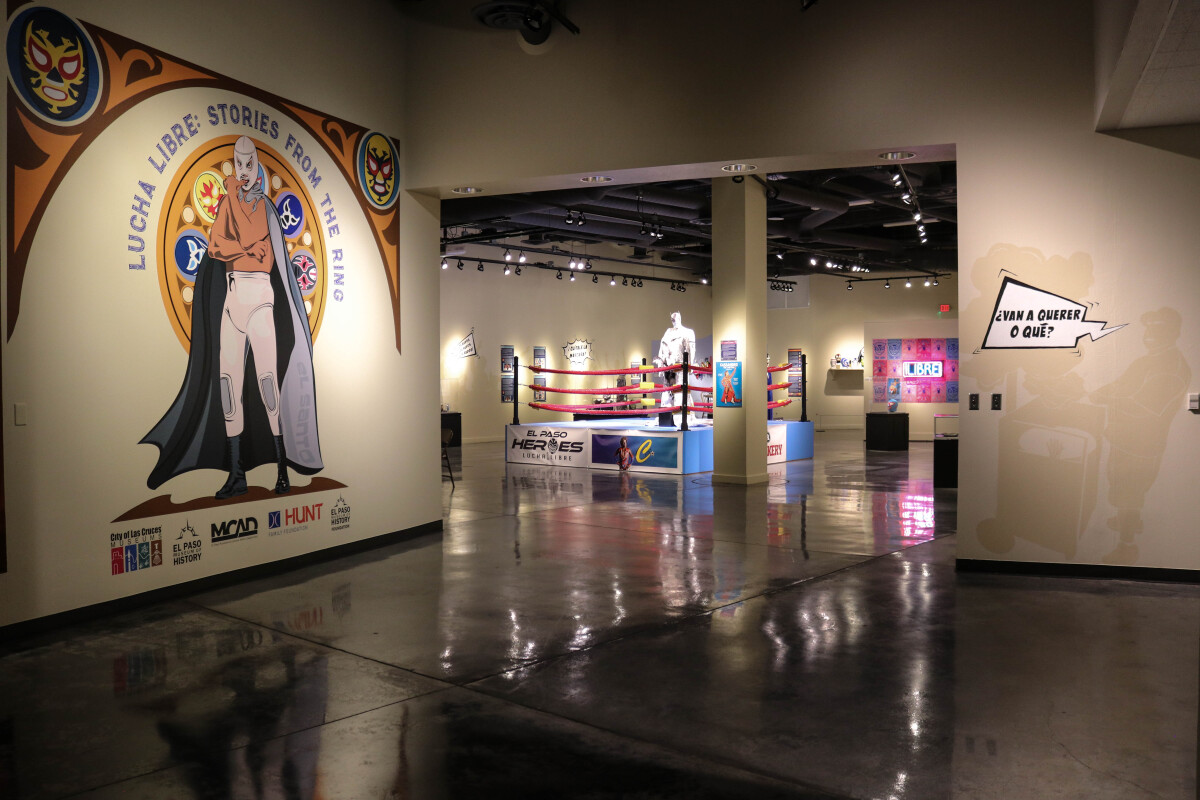
Lucha Libre: Stories from the Ring, El Paso Edition
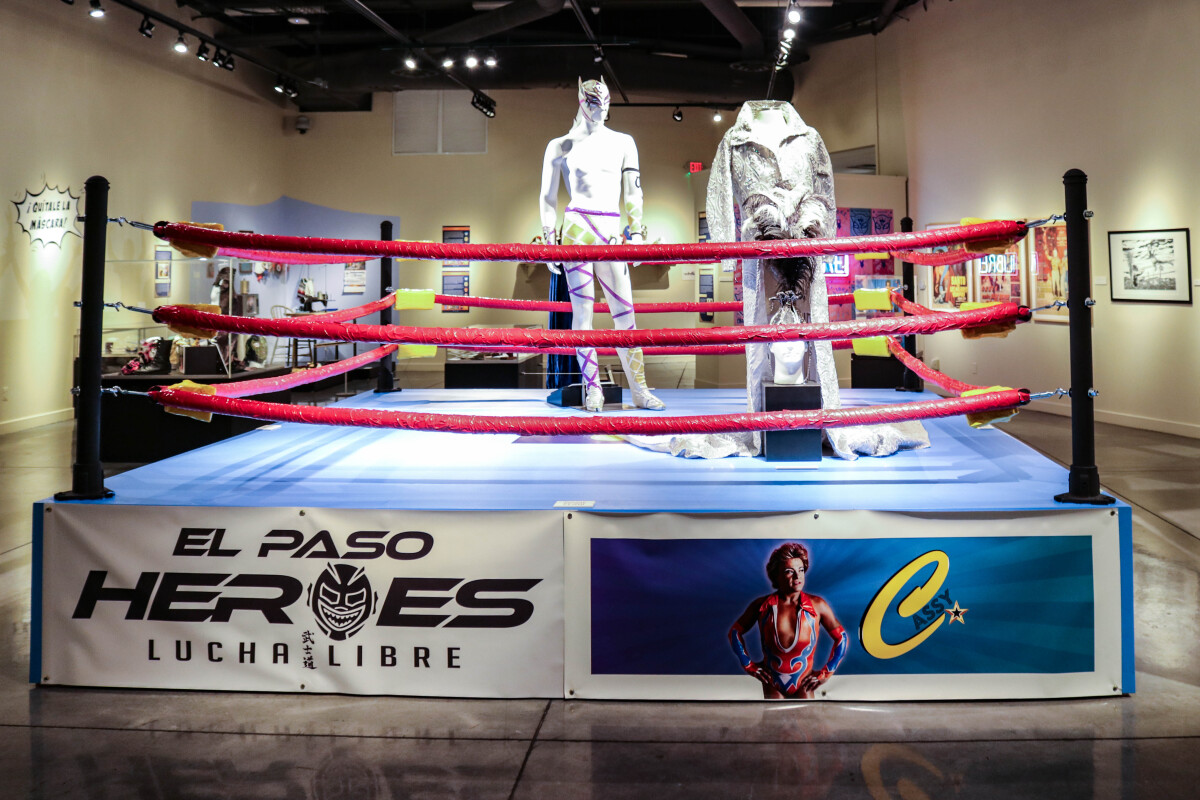
Lucha Libre: Stories from the Ring, El Paso Edition
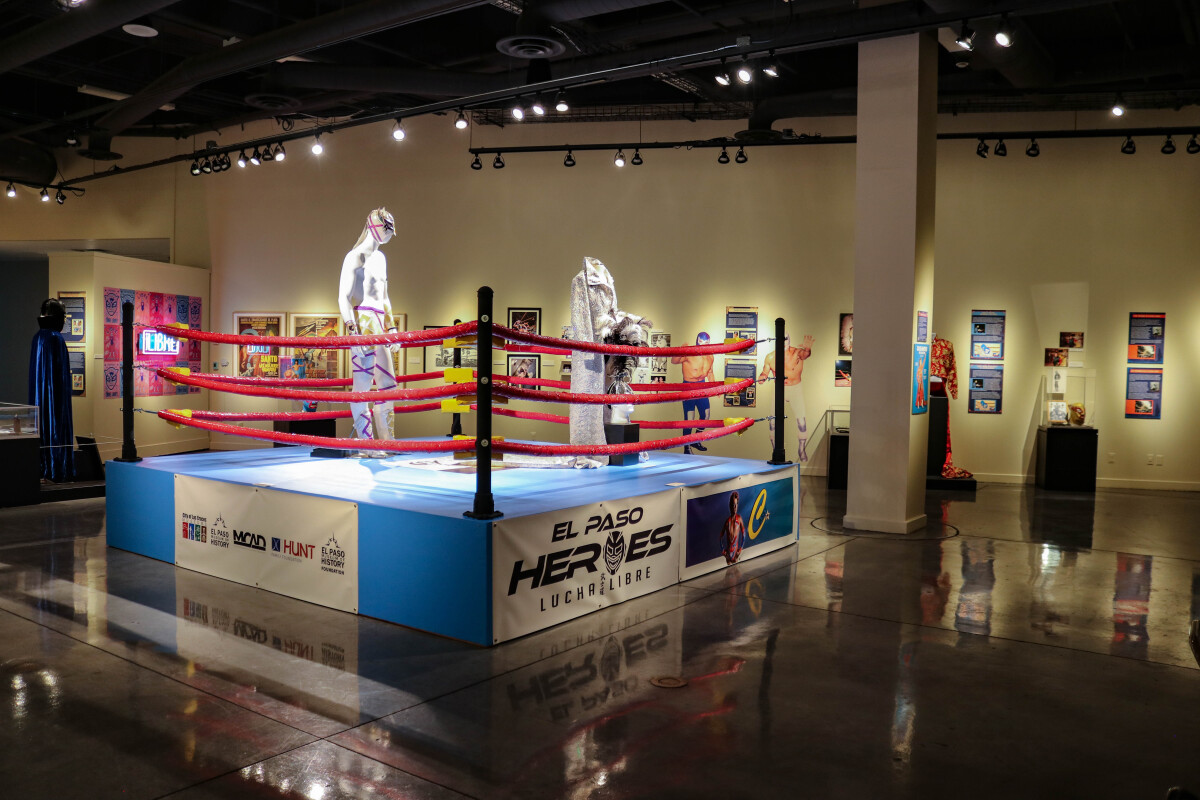
Lucha Libre: Stories from the Ring, El Paso Edition
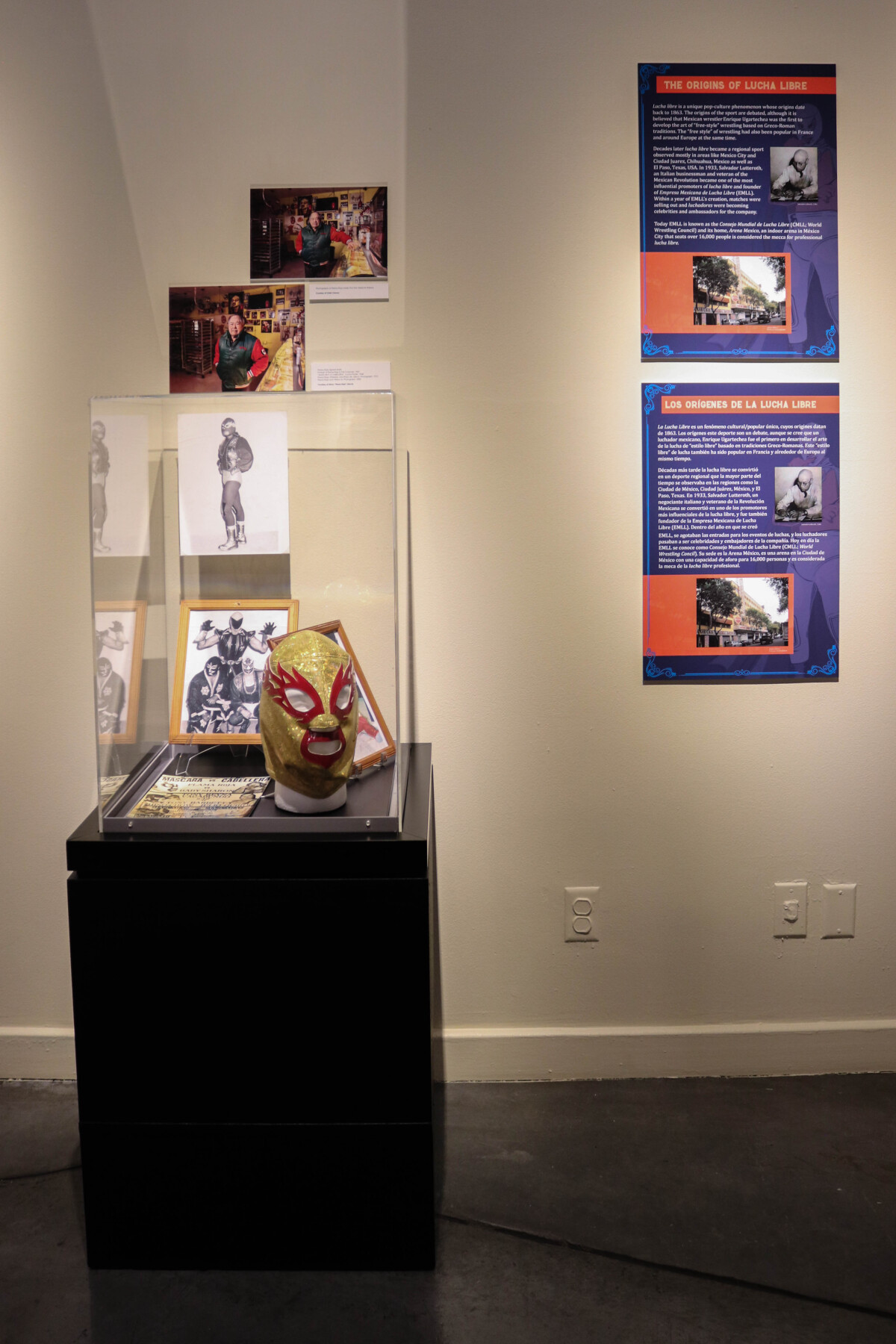
Lucha Libre: Stories from the Ring, El Paso Edition
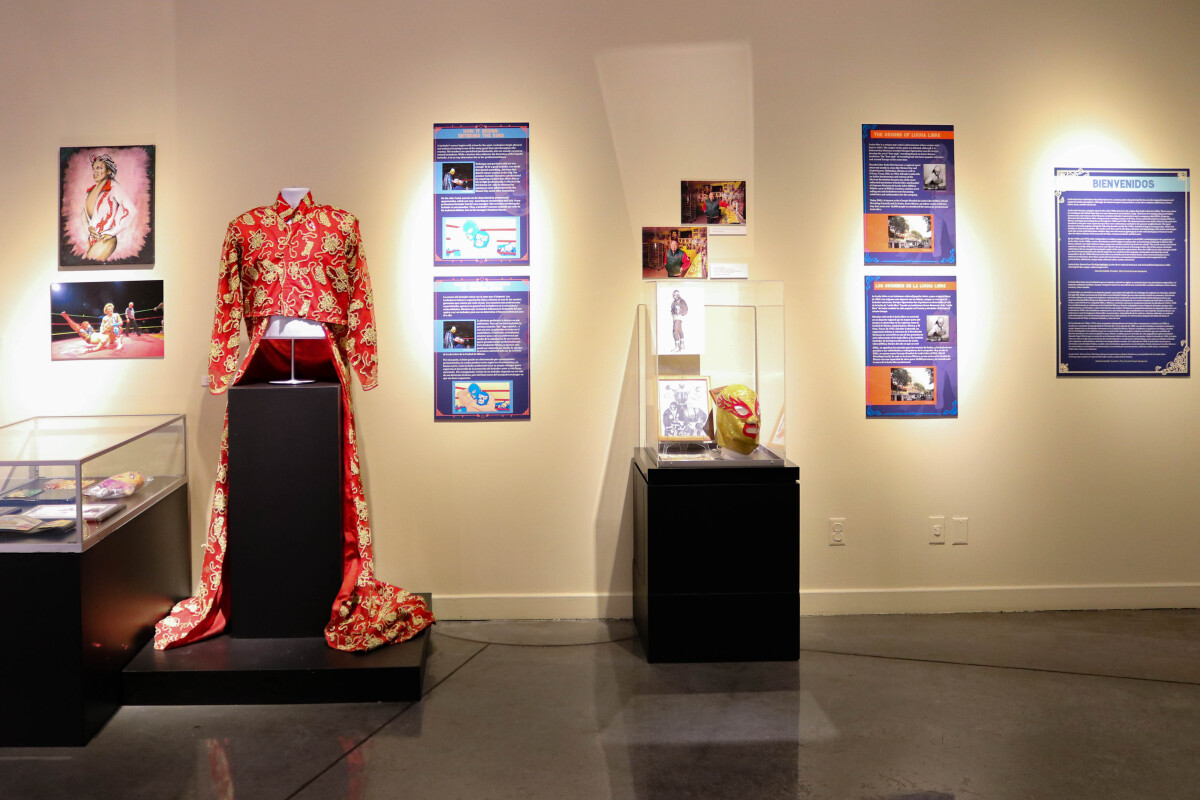
Lucha Libre: Stories from the Ring, El Paso Edition
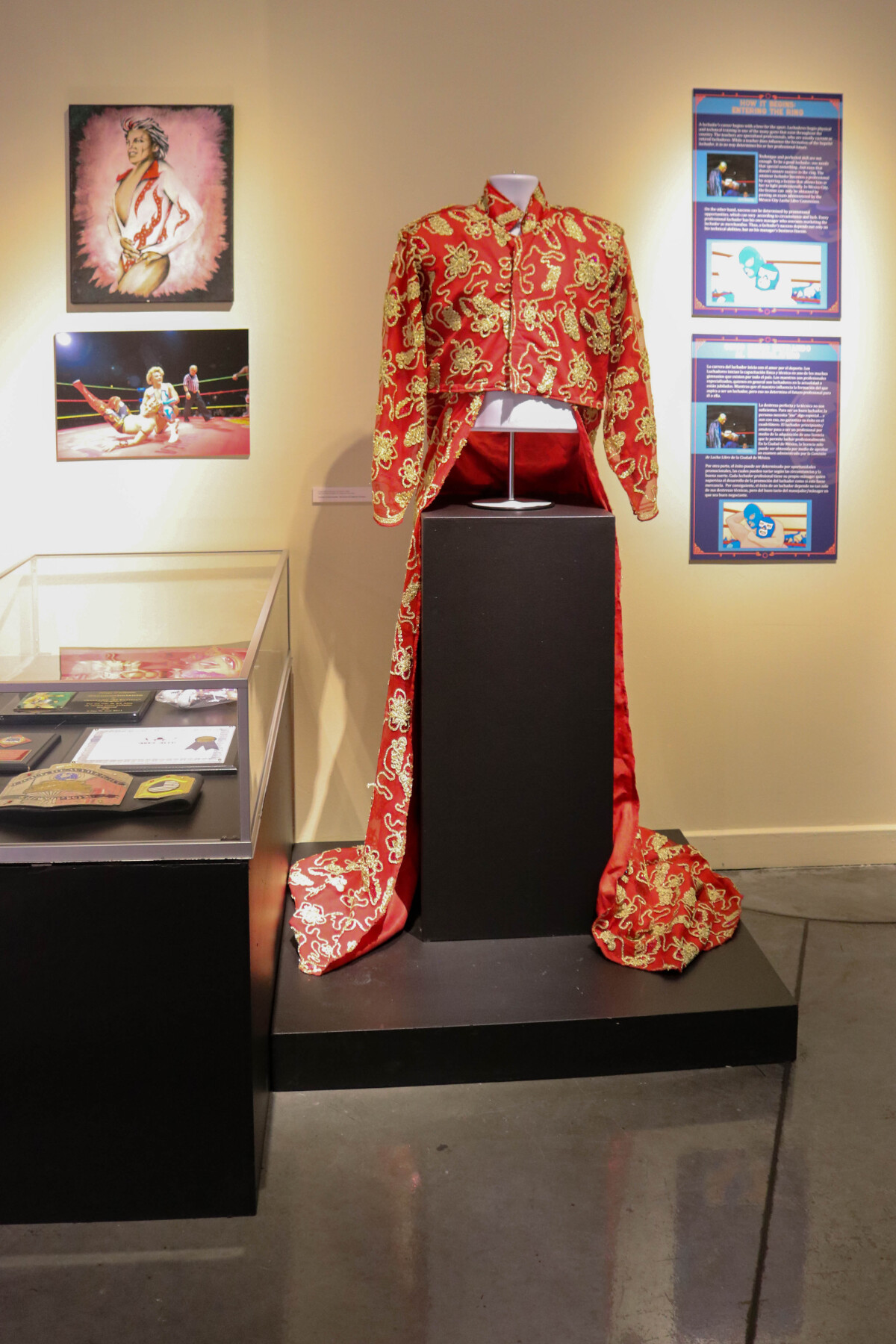
Lucha Libre: Stories from the Ring, El Paso Edition
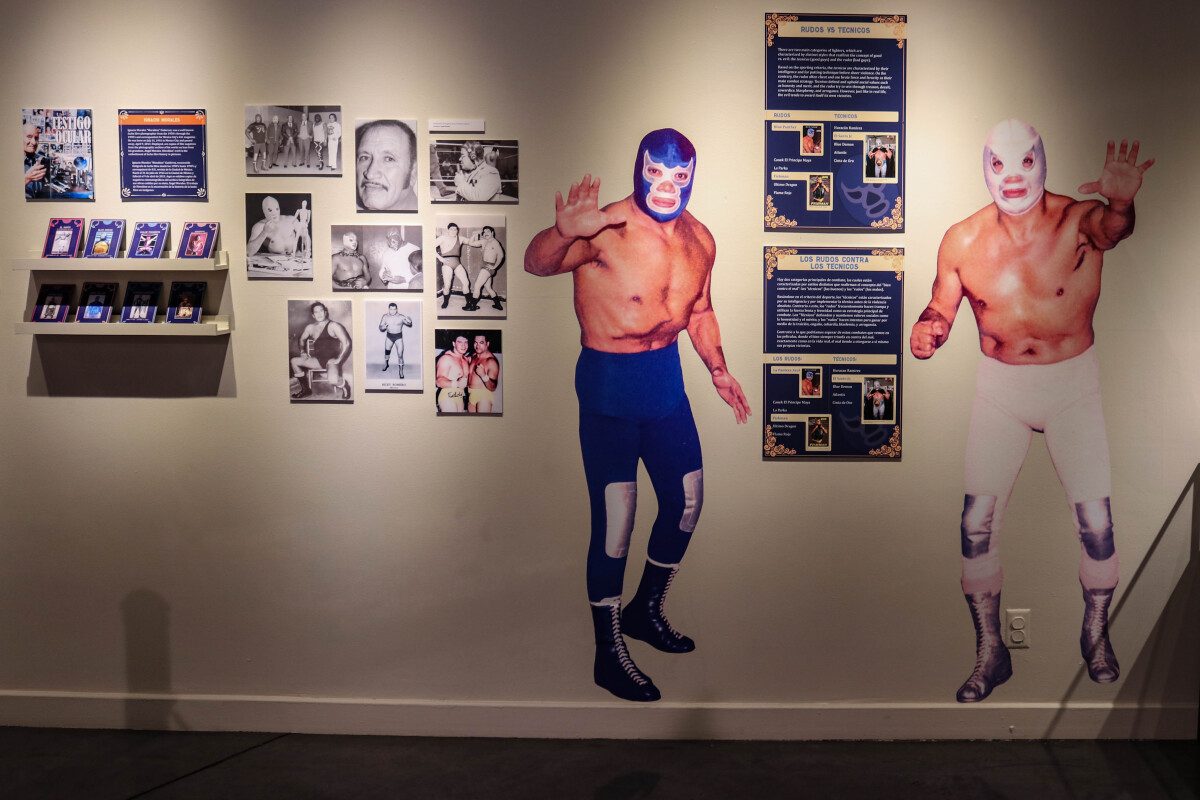
Lucha Libre: Stories from the Ring, El Paso Edition
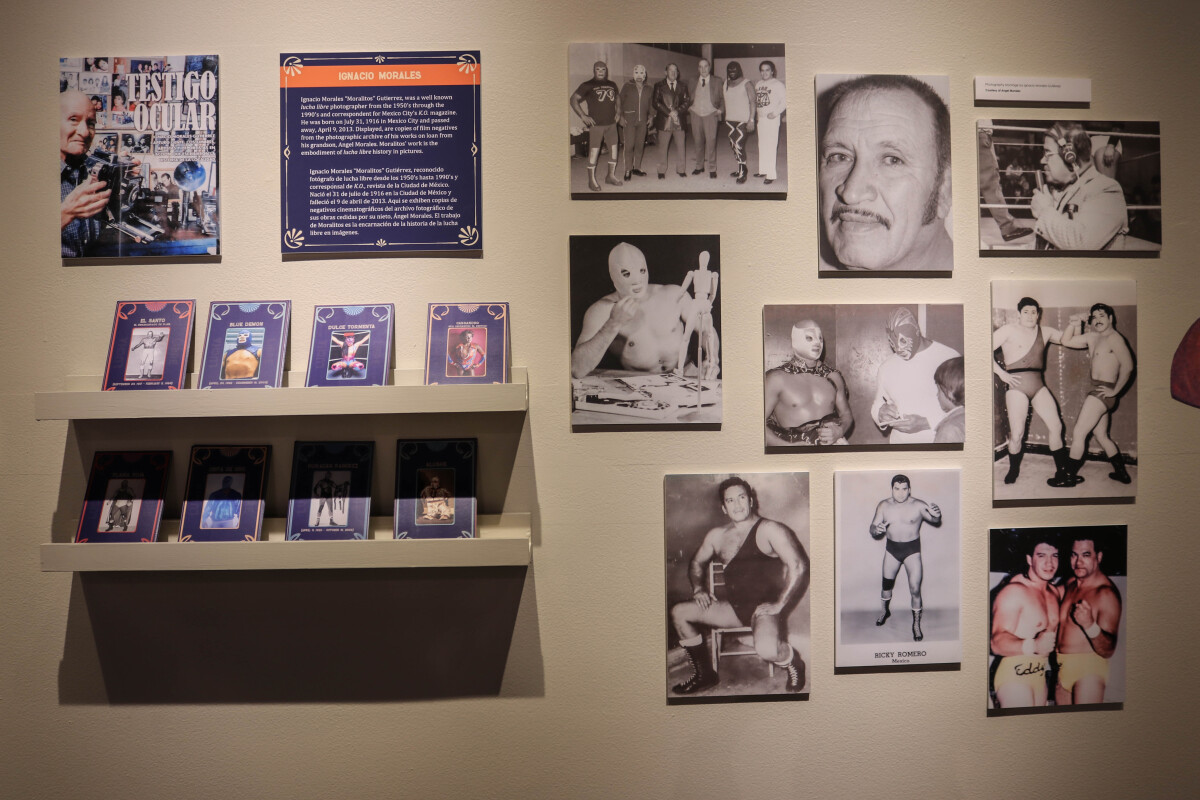
Lucha Libre: Stories from the Ring, El Paso Edition
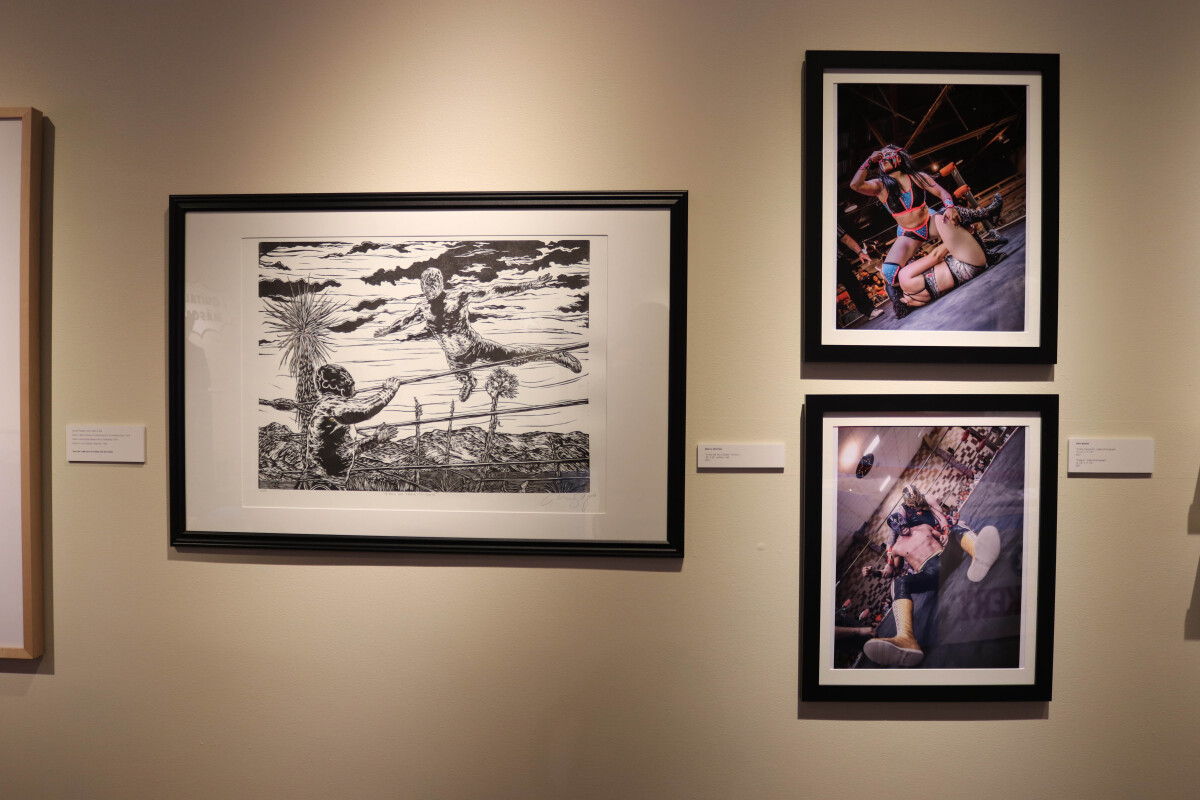
Lucha Libre: Stories from the Ring, El Paso Edition
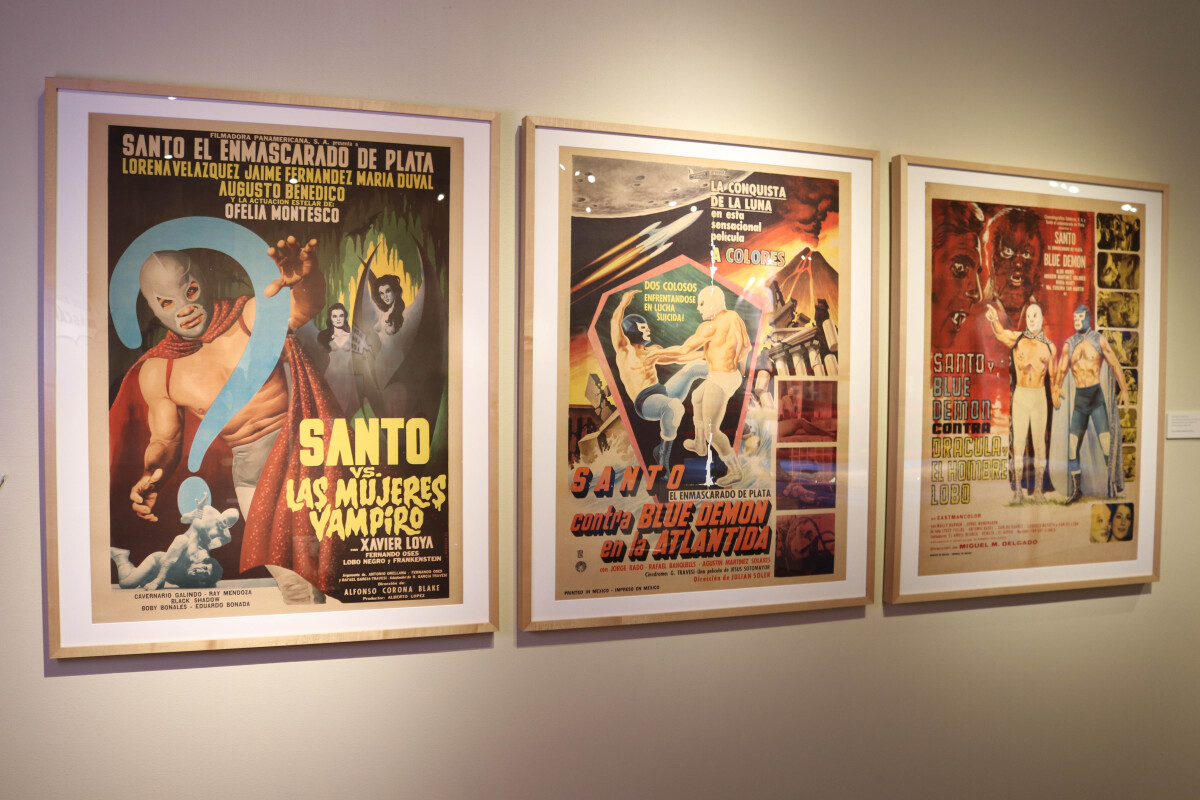
Lucha Libre: Stories from the Ring, El Paso Edition
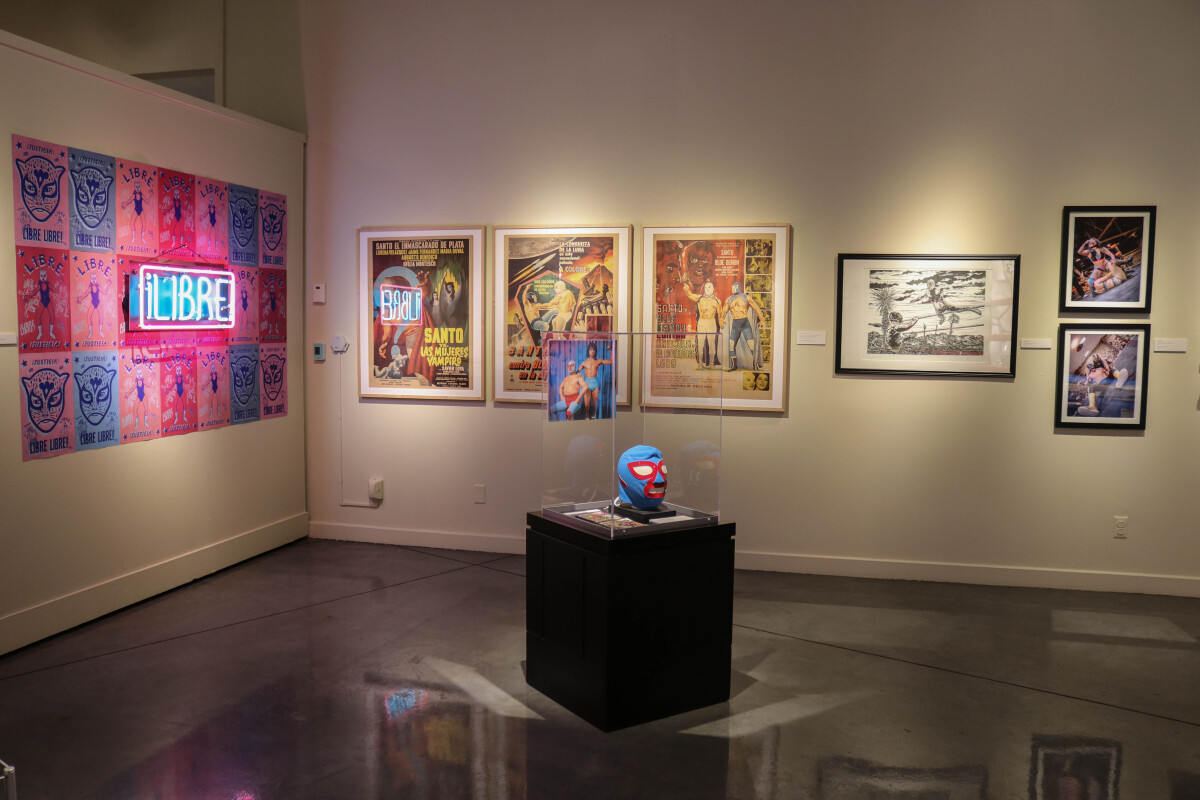
Lucha Libre: Stories from the Ring, El Paso Edition
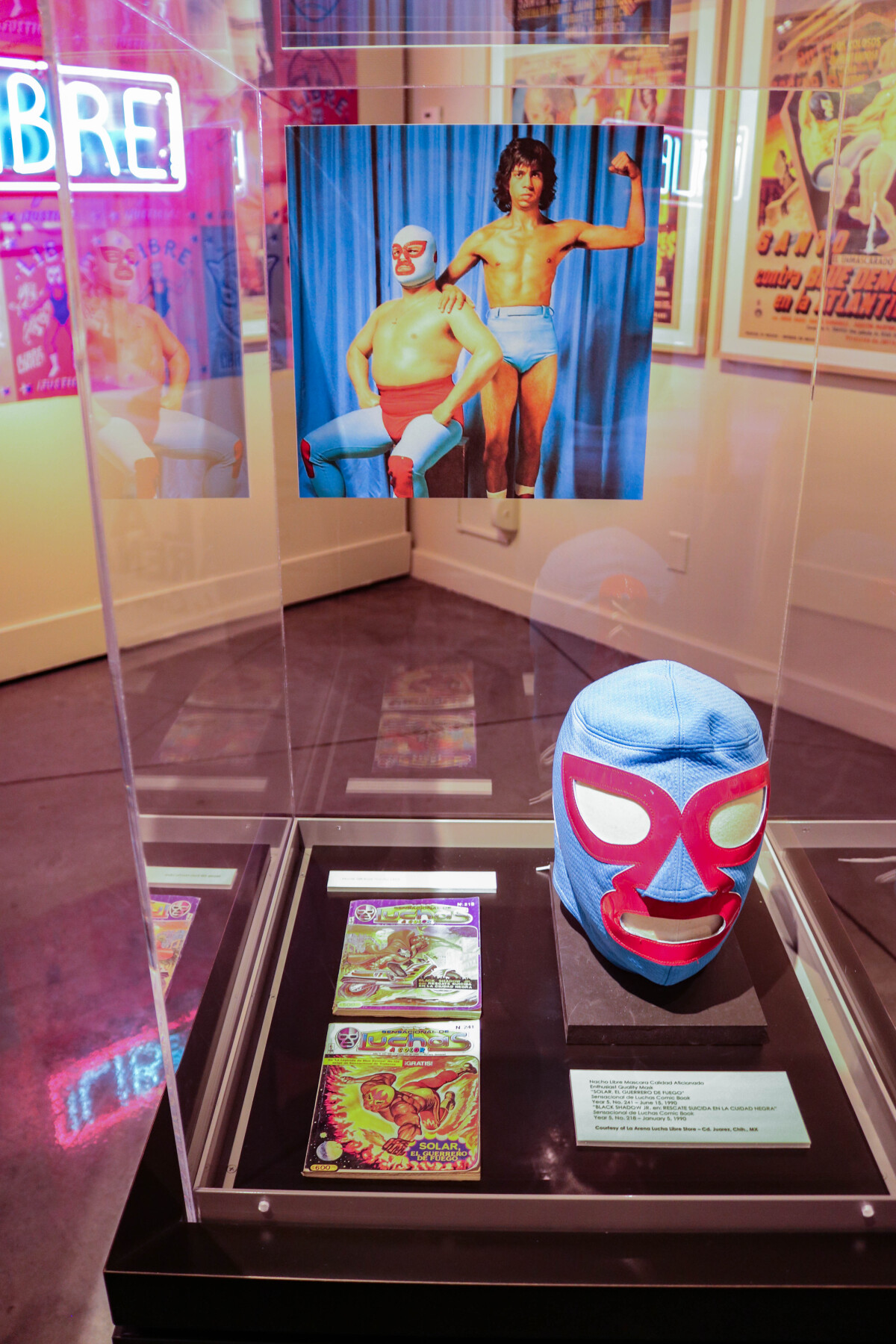
Lucha Libre: Stories from the Ring, El Paso Edition
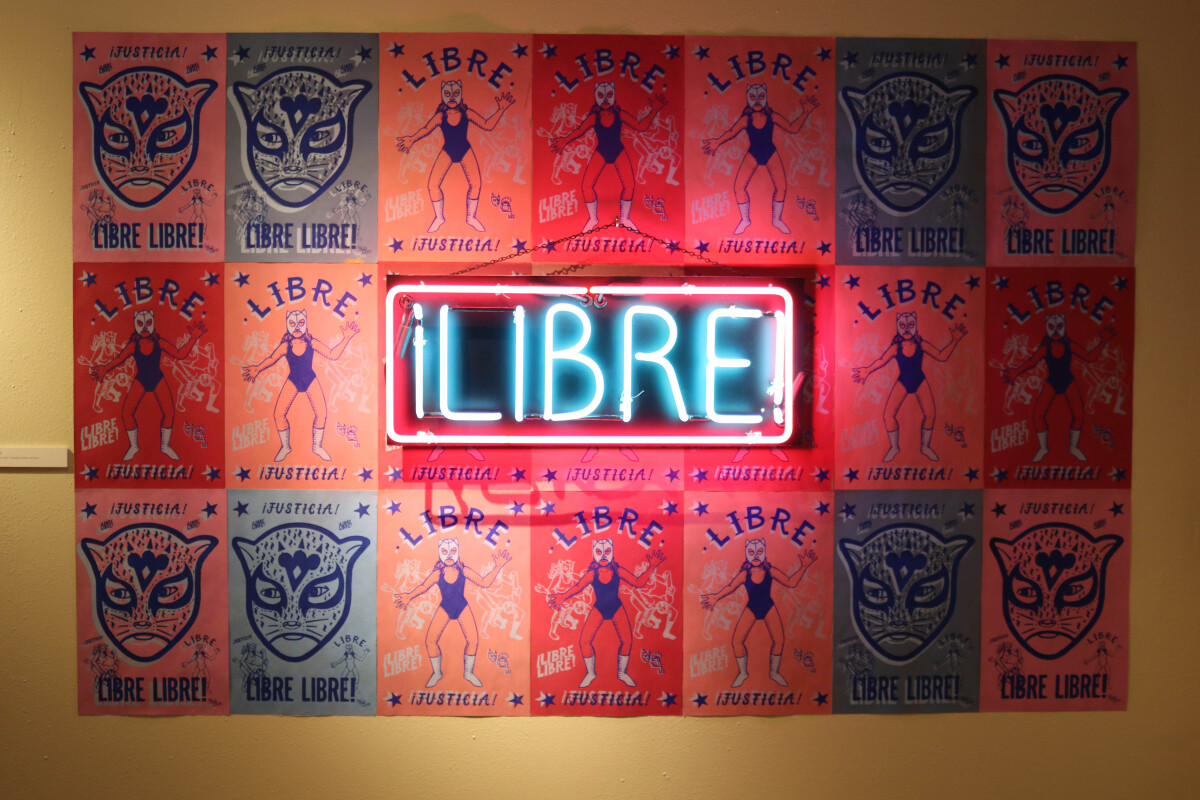
Lucha Libre: Stories from the Ring, El Paso Edition
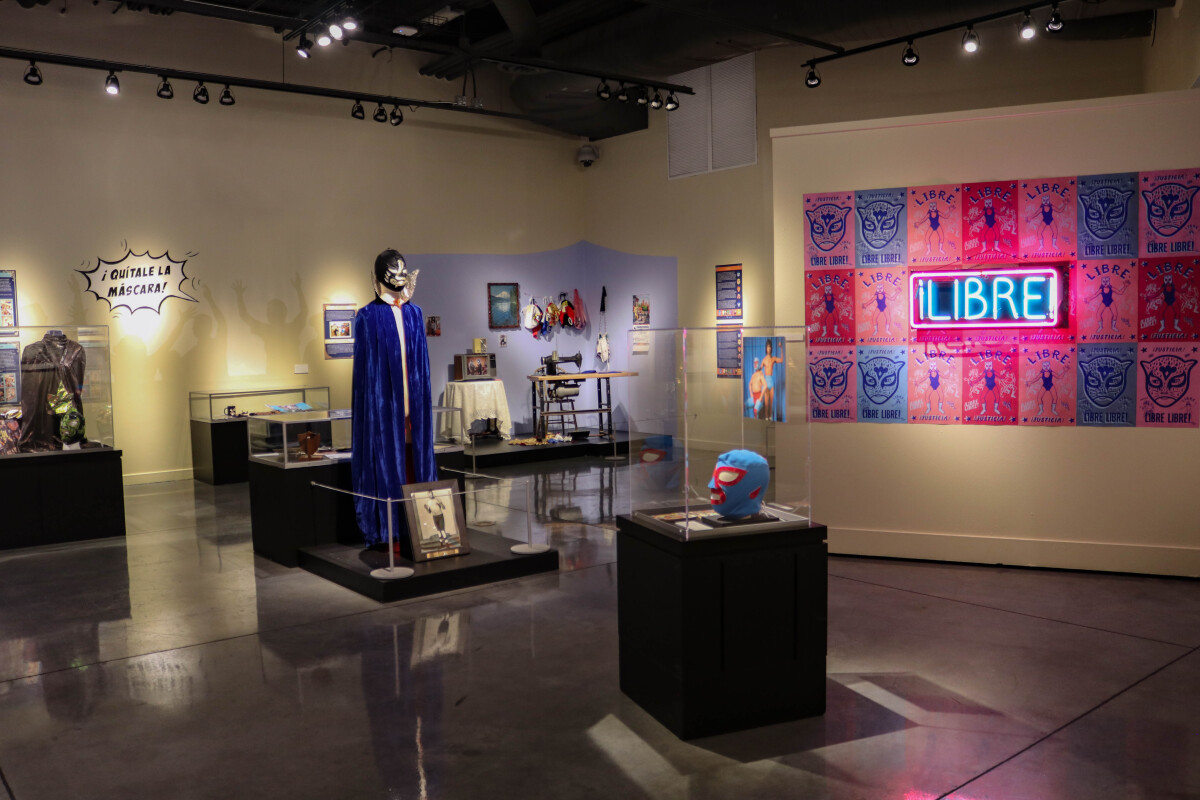
Lucha Libre: Stories from the Ring, El Paso Edition
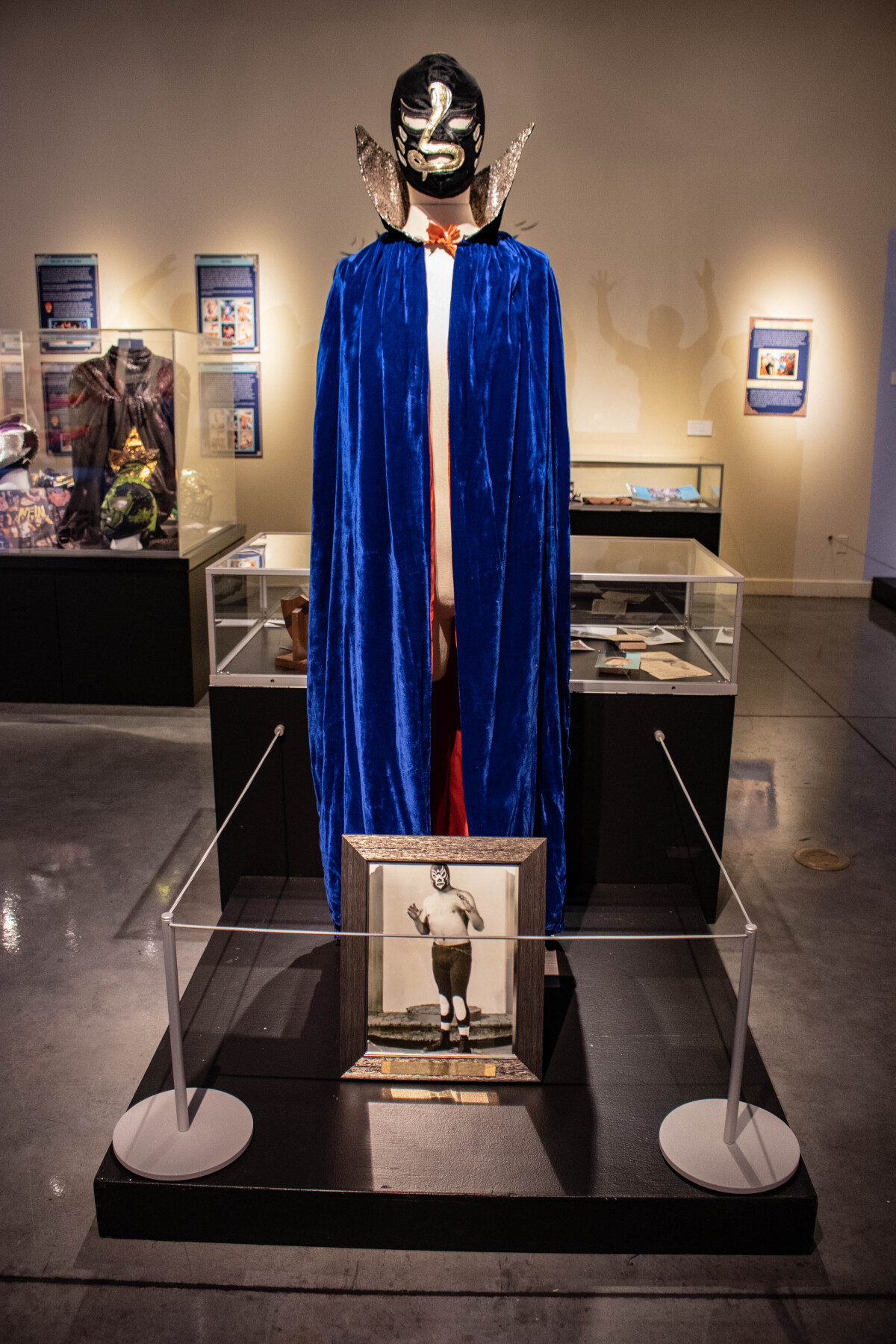
Lucha Libre: Stories from the Ring, El Paso Edition
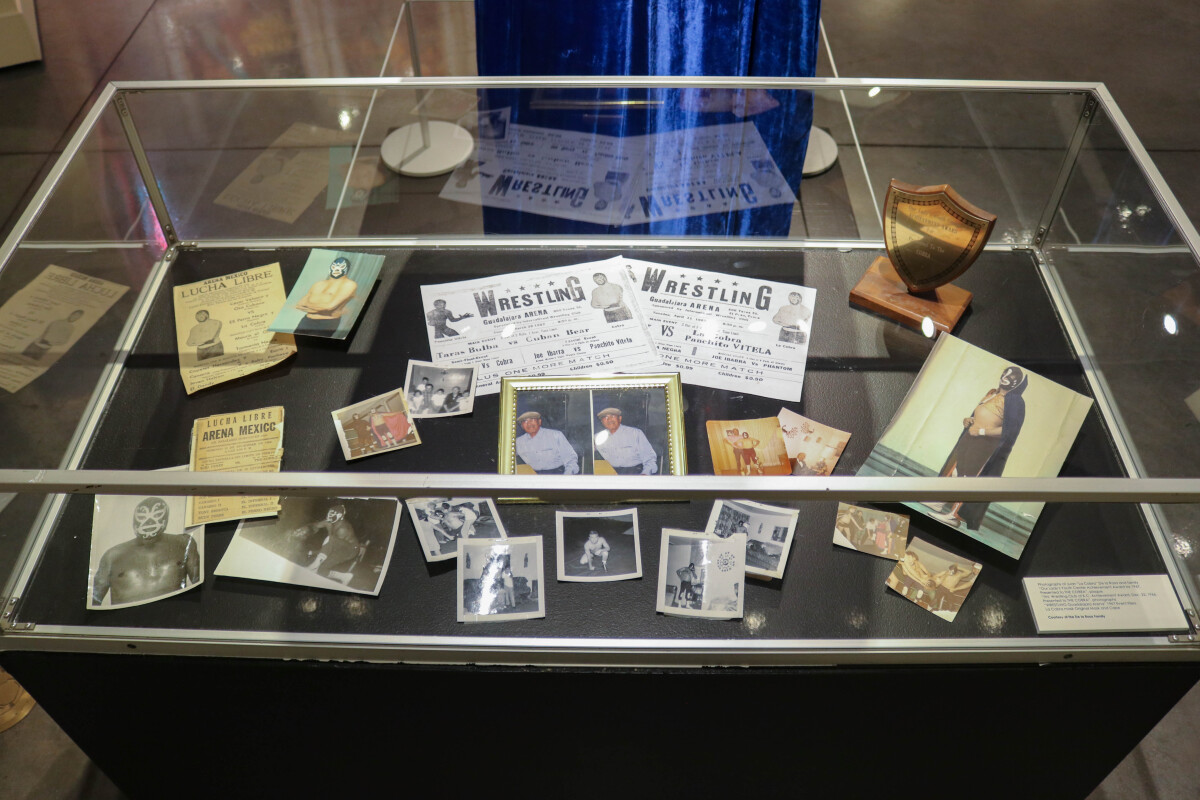
Lucha Libre: Stories from the Ring, El Paso Edition
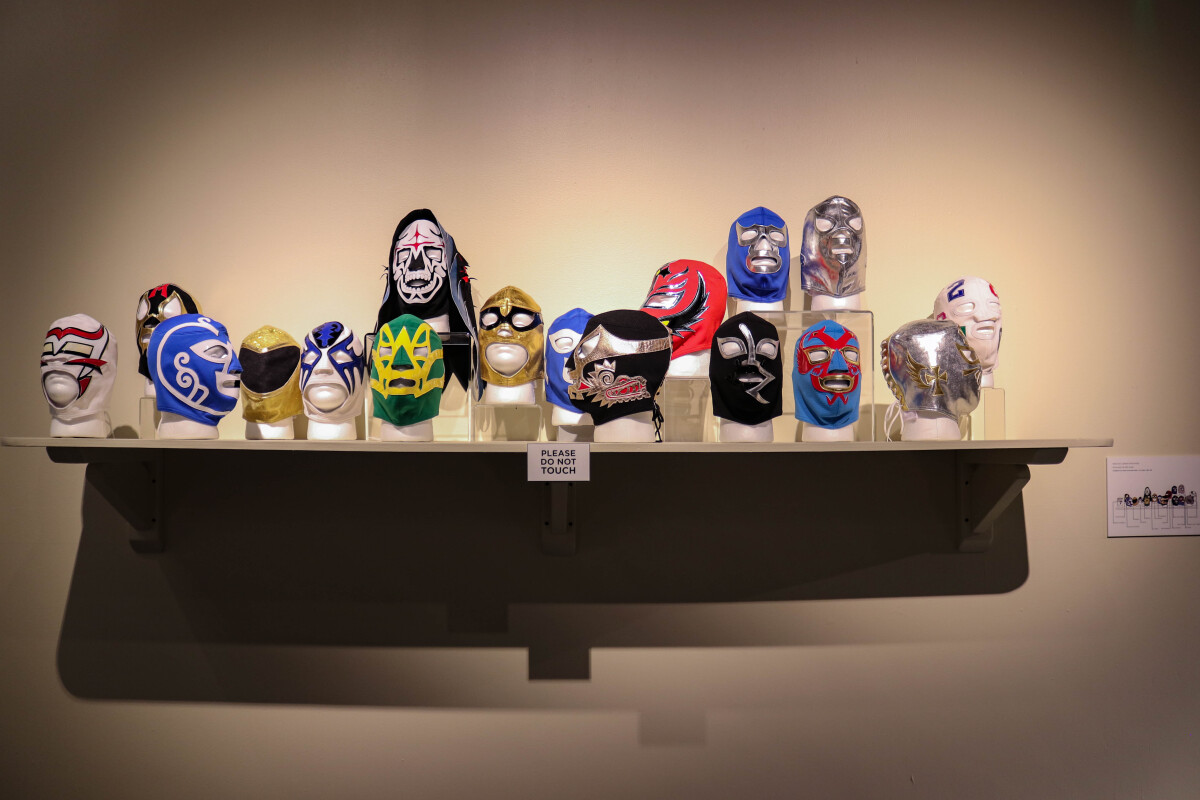
Lucha Libre: Stories from the Ring, El Paso Edition
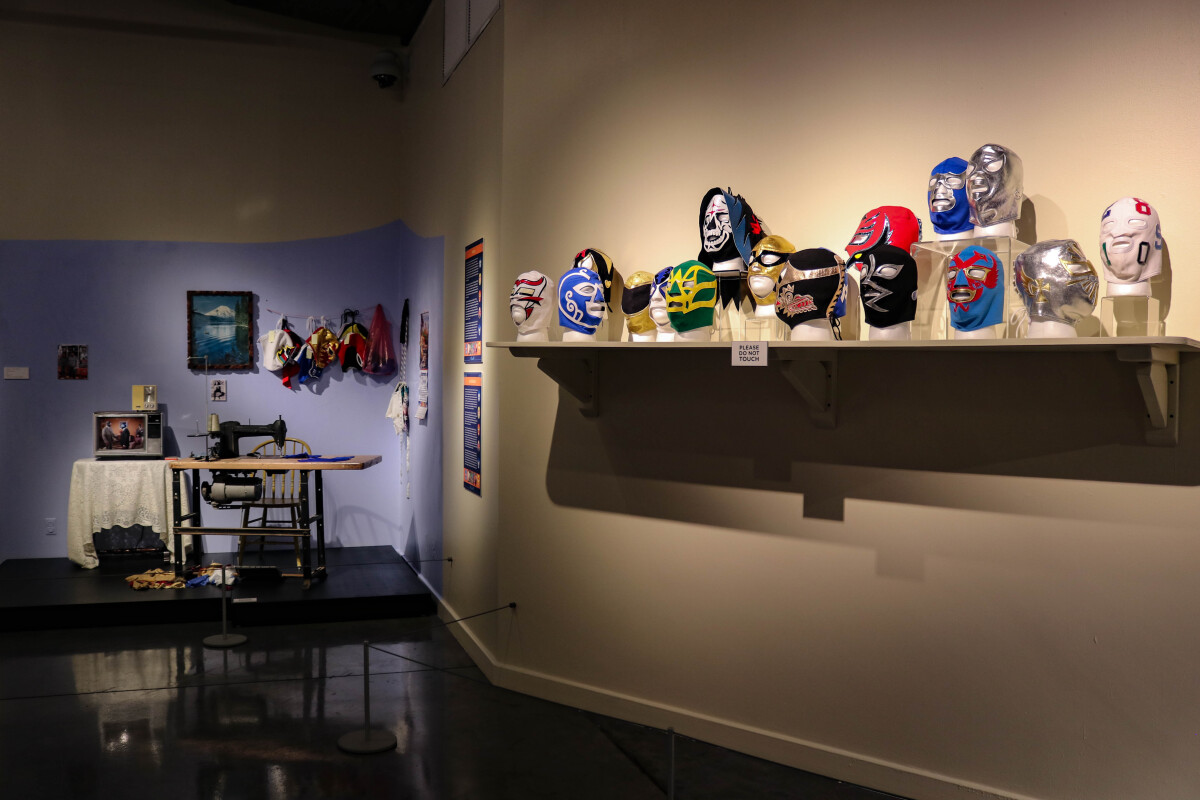
Lucha Libre: Stories from the Ring, El Paso Edition
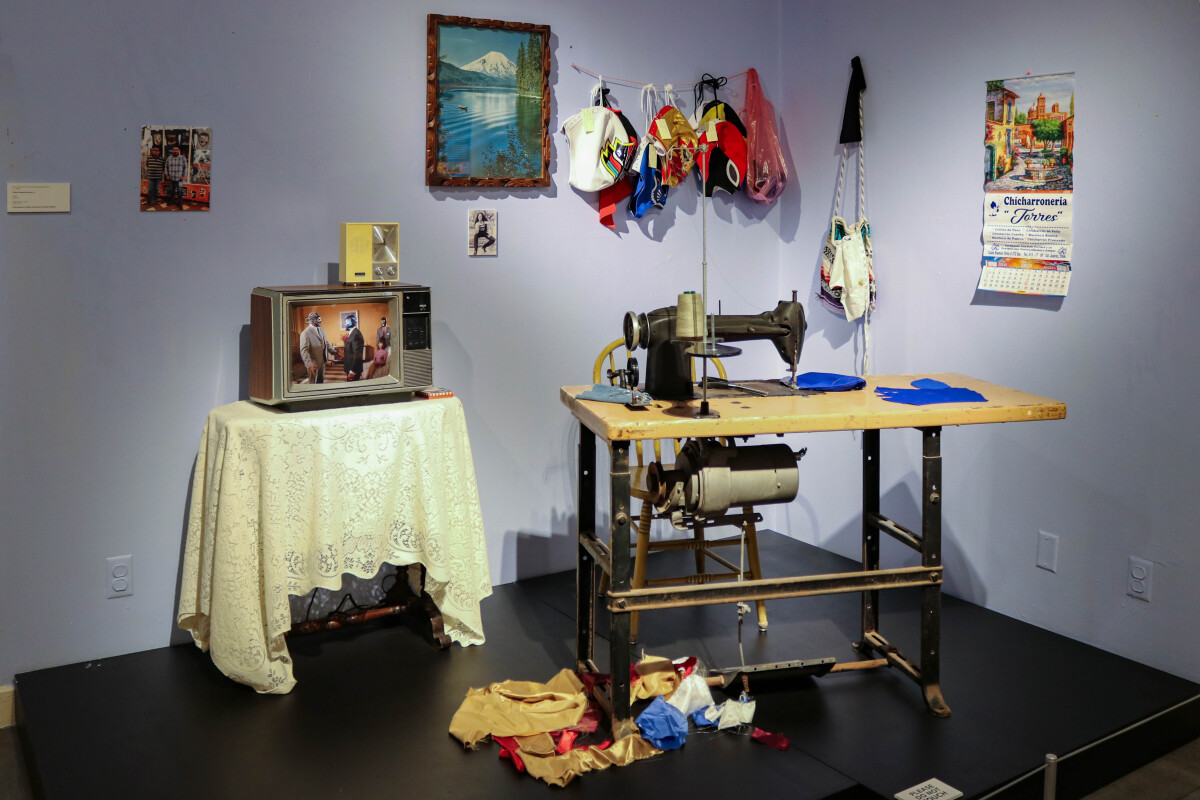
Lucha Libre: Stories from the Ring, El Paso Edition
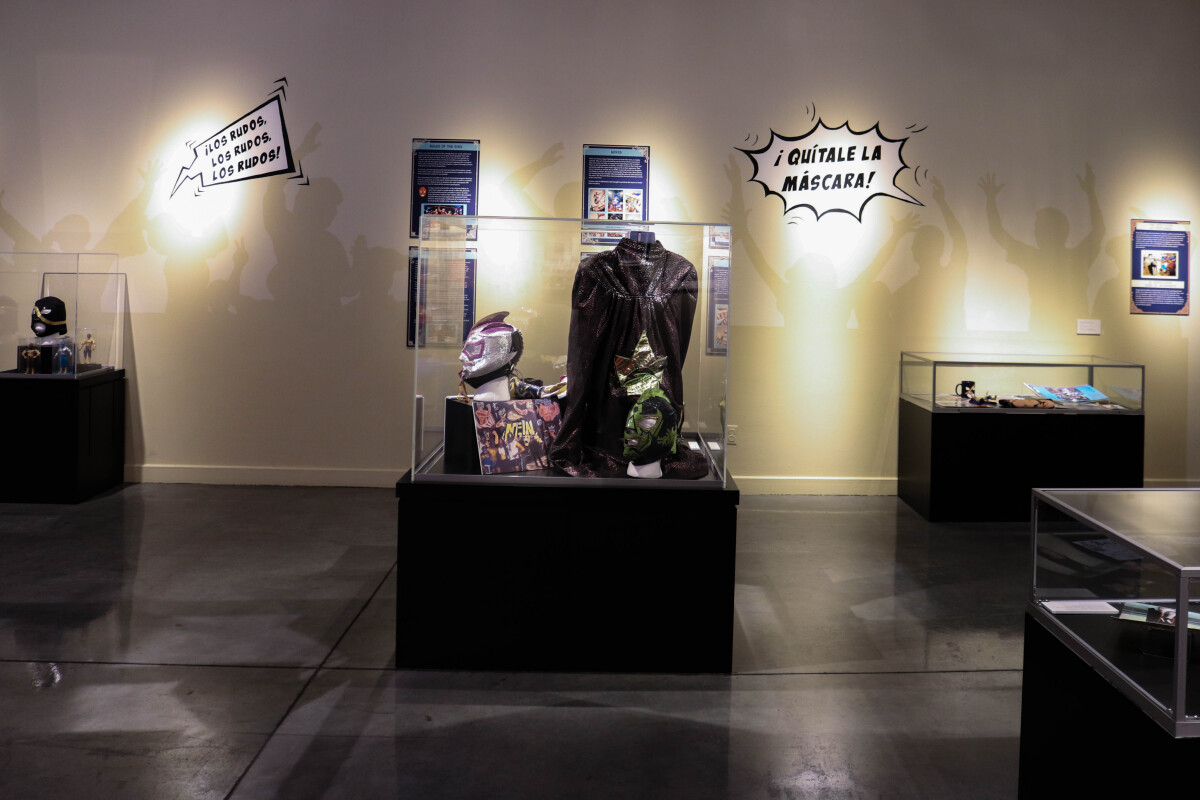
Lucha Libre: Stories from the Ring, El Paso Edition
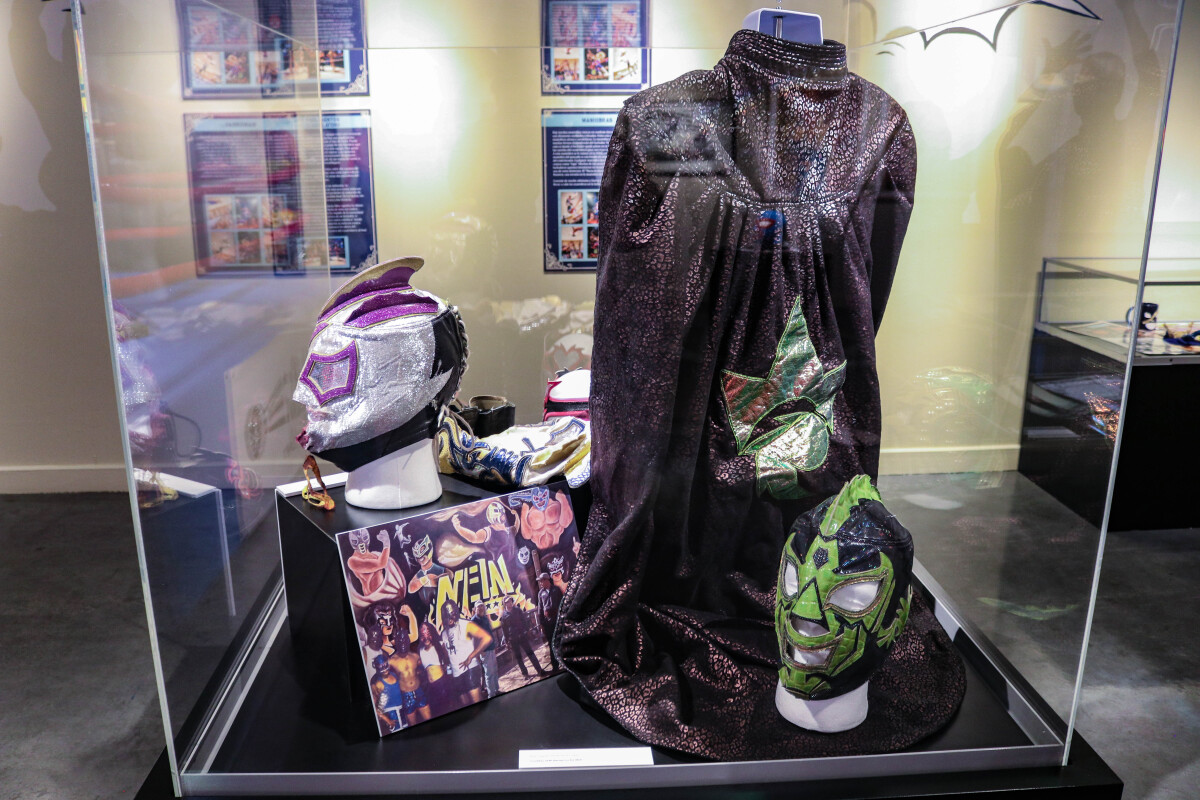
Lucha Libre: Stories from the Ring, El Paso Edition
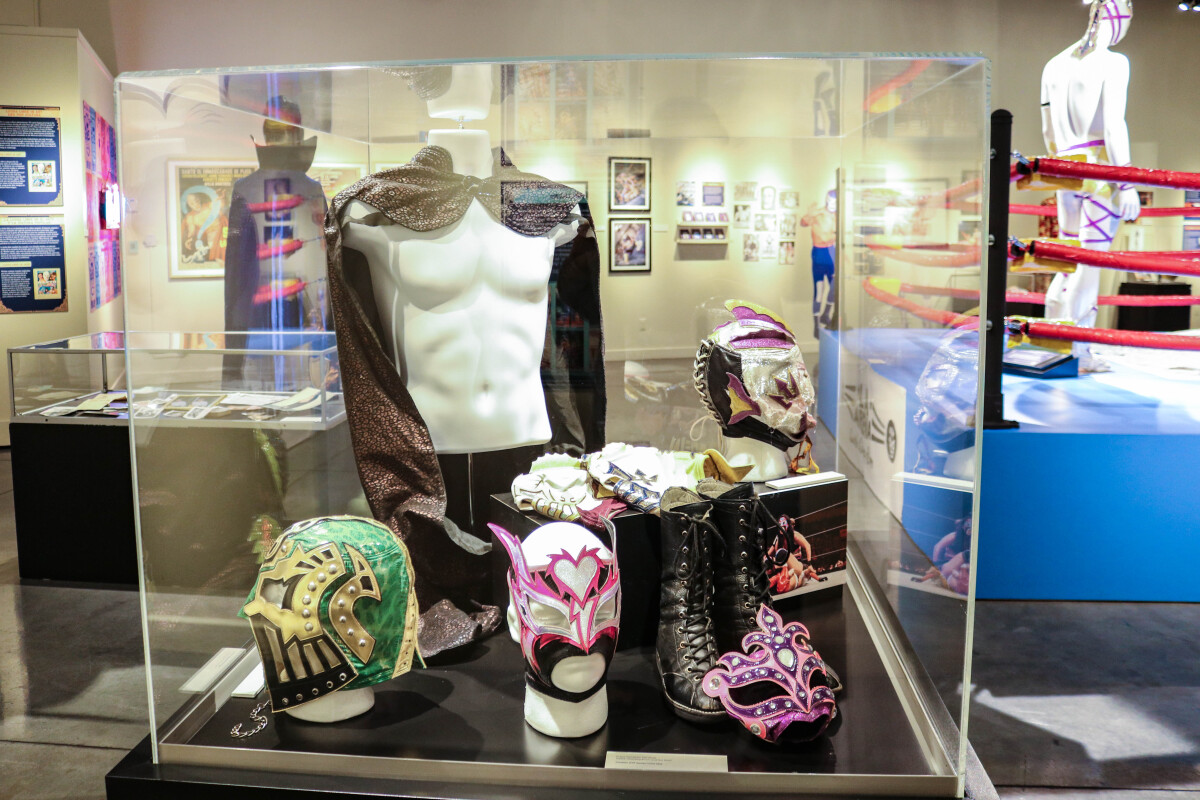
Lucha Libre: Stories from the Ring, El Paso Edition
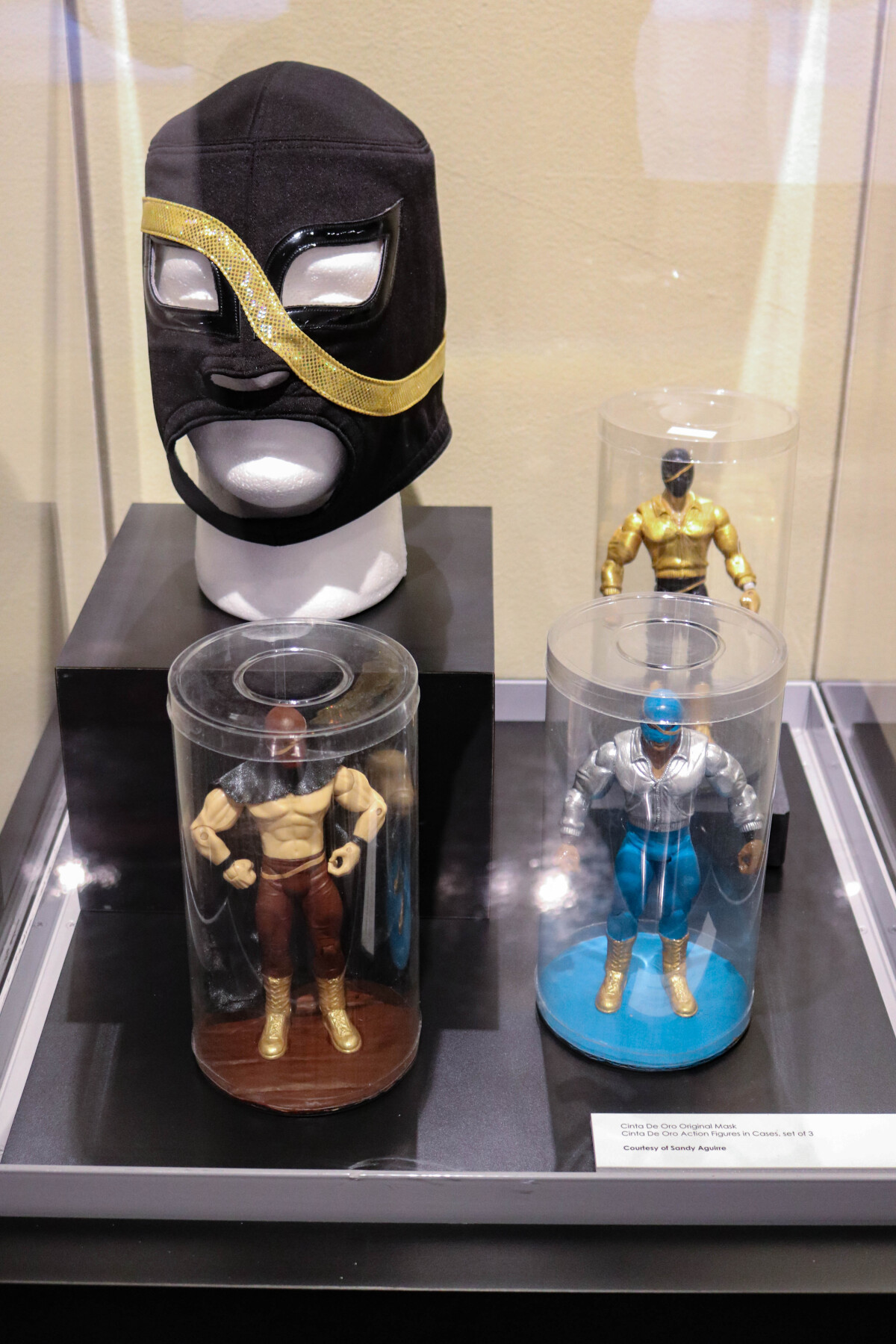
Lucha Libre: Stories from the Ring, El Paso Edition
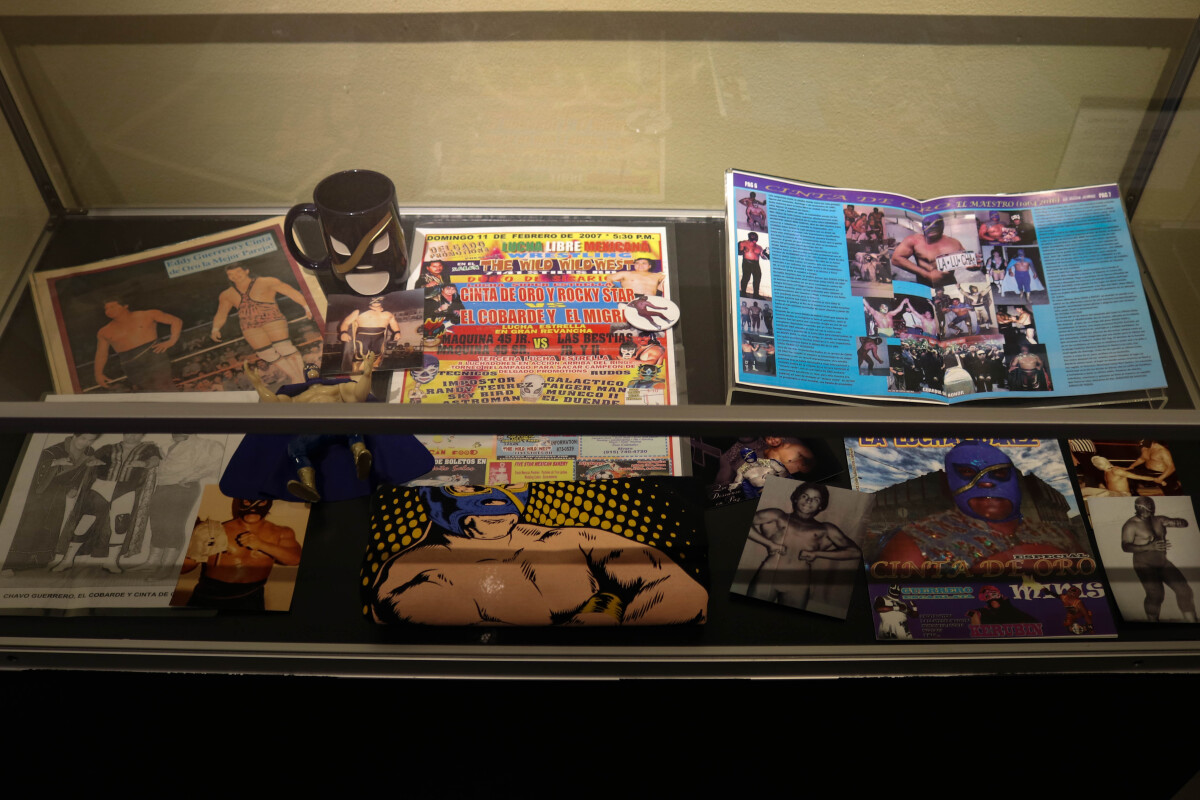
Lucha Libre: Stories from the Ring, El Paso Edition
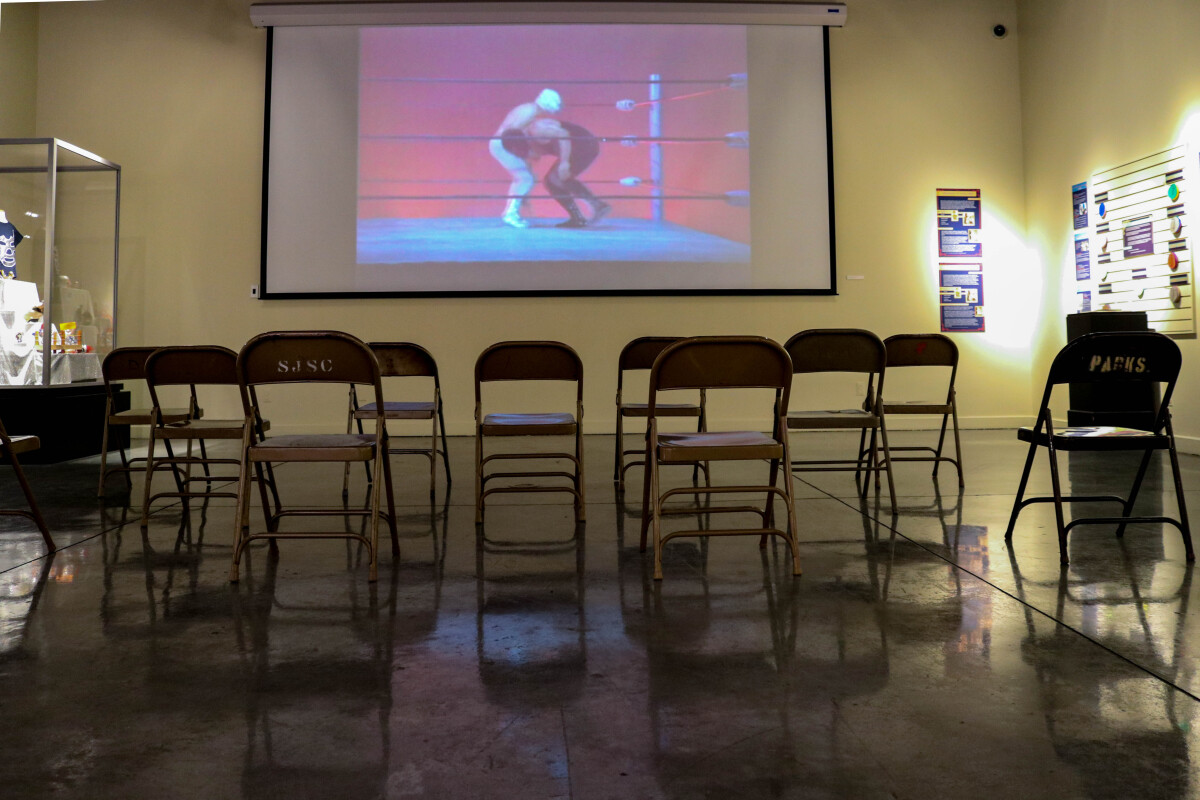
Lucha Libre: Stories from the Ring, El Paso Edition
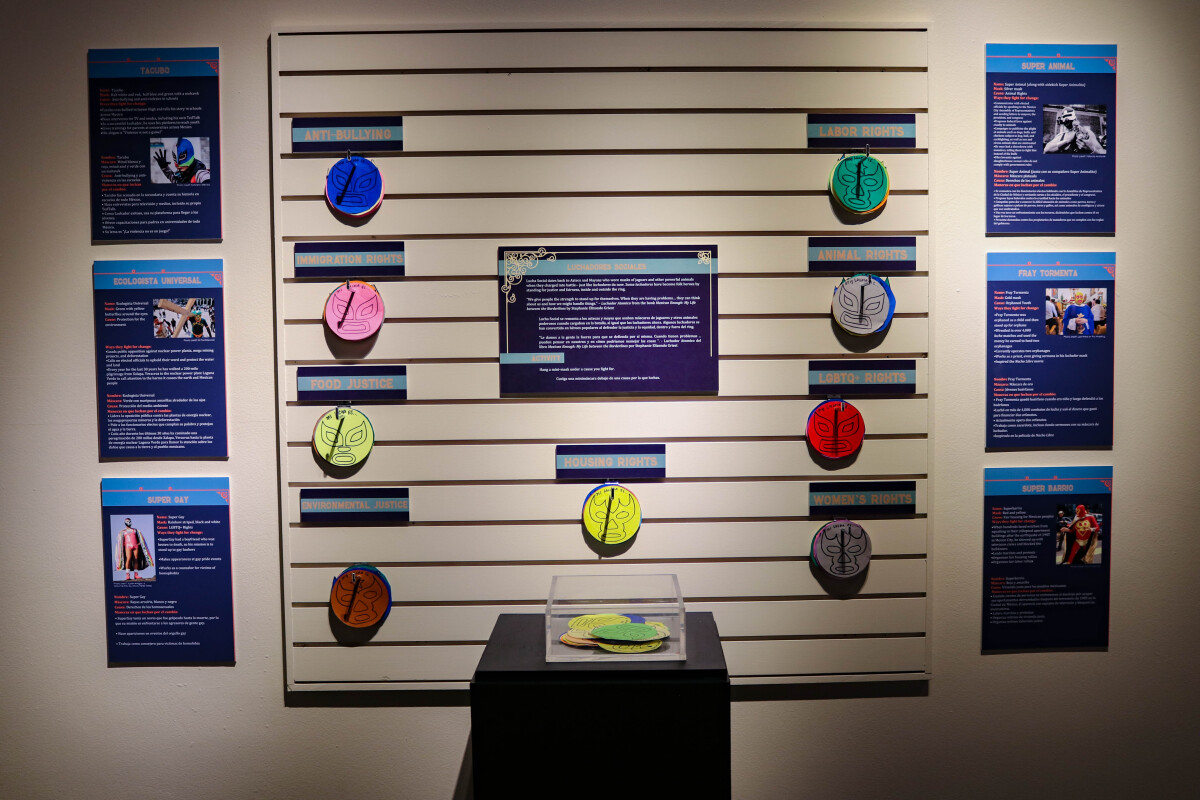
Lucha Libre: Stories from the Ring, El Paso Edition
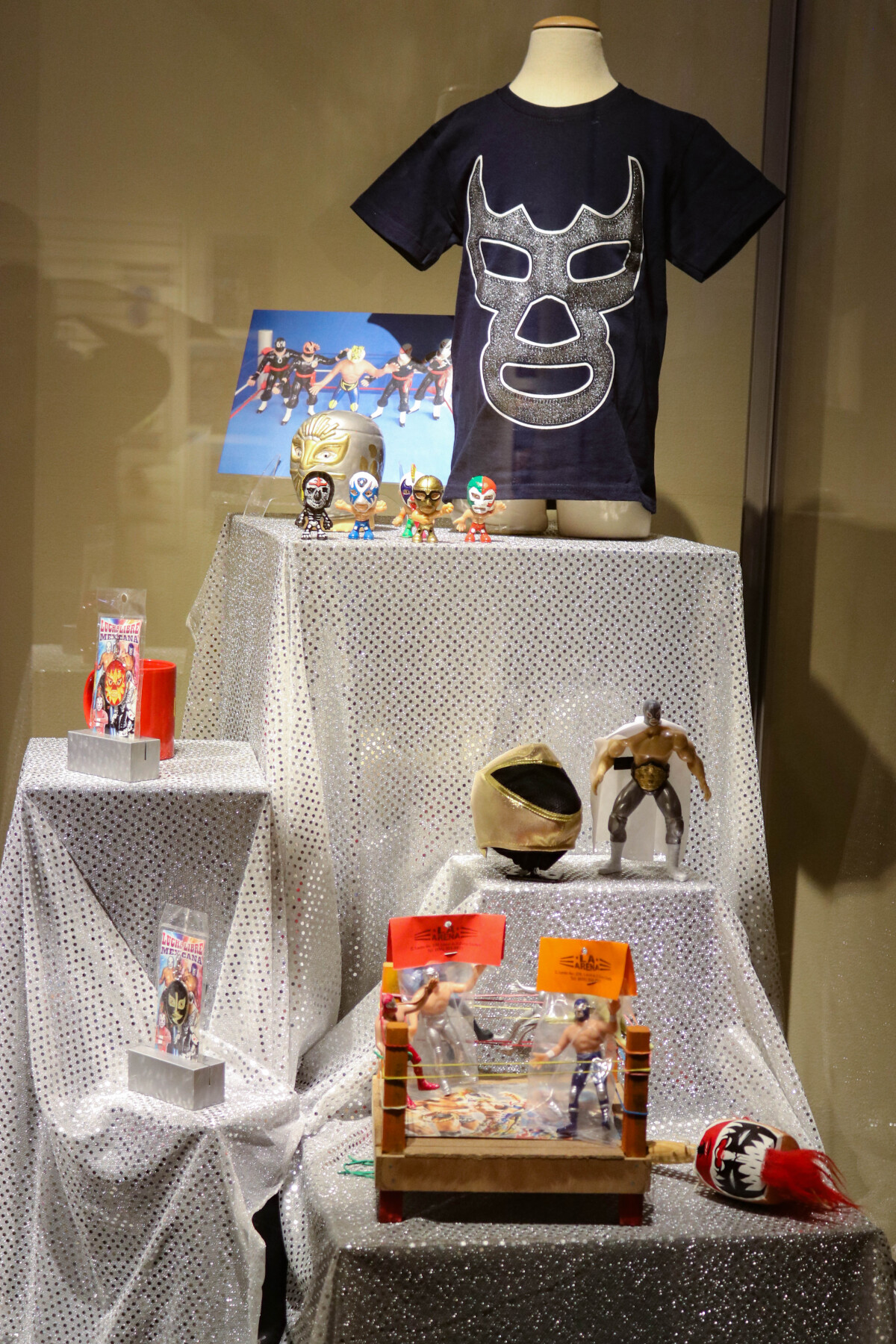
Lucha Libre: Stories from the Ring, El Paso Edition
The exhibition tells the history of Lucha Libre, its connections to the border region, and the stories that have come from the sport. Lucha Libre: Stories from the Ring, El Paso edition, will showcase stories, sponsors and memorabilia all related to local Lucha Libre history. The Museum of History has partnered with the City of Las Cruces Museums to bring the exhibition to El Paso. The original exhibition opened at the Branigan Cultural Center in Las Cruces, New Mexico, in the spring of 2020, but it had to be cut short because of the COVID-19 pandemic. "Lucha Libre has a rich history that dates back over a century and is characterized for its over-the-top performances and supposed macho atmosphere. Although, the theatrical sport is beyond that. Lucha Libre combines athleticism, theater, dance, story, and the visual arts. Lucha Libre became a popular sport in the early 1900s; however, the origins date back to the late 1800s. There was a form of wrestling in the United Sates that was more theatrical and included a stage. This form of wrestling influenced Italian businessman and veteran of the Mexican revolution Salvador Lutterroth to start a company called EMLL (Empresa Mexicana de Lucha Libre). After seeing several wrestling matches in El Paso, Texas, Lutteroth took his company EMLL to Mexico and began promoting shows through the 1920s and 1930s. The demonstrations were held in Mexico City and were classified as the poor man's sport because they were rudimentary and held in the poorest neighborhoods. The sport became extremely popular during the following decades and by the 1950s, luchadores began wearing masks, which was initiallv an American tradition. The masks were then used to develop a character and depending on the colors and designs used, the crowd could determine whether they were the tecnicos (good guys) or the rudos (bad guys). It became iconic after the debut of Santo el Enmascarado de Plata, a famous luchador and film actor. By the 1960s and 1970s other independent wrestling companies began to rival EMLL and helped grow the popularity of Lucha Libre. In the 1980s, a wave of luchadores activist began to emerge after a devastating earthquake in Mexico City. Many residents were left without a home, many were evicted, and the city had to be rebuilt. This social anxiety and unrest caused an assembly of Barrios to march and rally for the government to housing credits. Out of this unrest a luchador called Super Barrio emerged becoming the staple of the marches and protests. Since the 1980s Lucha Libre not only stands as a form of entertainment and cultural staple but as a symbol used to organize communities and stand for social inequalities. By the 1990s Mexican Lucha Libre was introduced to the United States, when several luchadores were featured on television. Since then, Lucha Libre has become a transnational phenomenon and recognized for thepresentation, athleticism, unique style, elaborate attire, masks, and stories. Lucha Libre: Stories From The Ring highlights Lucha Libre's cultural, historical, and social political importance whileshowing the fun, unique, cultural aspect of it." -Norma Hartell, Curator, City of Las Cruces Museums
Area: Central / Downtown
Source: El Paso Museum of History; Las Cruces Museums
Uploaded by: El Paso Museum of History
Lucha Libre: Stories from the Ring, El Paso Edition
The exhibition tells the history of Lucha Libre, its connections to the border region, and the stories that have come from the sport. Lucha Libre: Stories from the Ring, El Paso edition, will showcase stories, sponsors and memorabilia all related to local Lucha Libre history. The Museum of History has partnered with the City of Las Cruces Museums to bring the exhibition to El Paso. The original exhibition opened at the Branigan Cultural Center in Las Cruces, New Mexico, in the spring of 2020, but it had to be cut short because of the COVID-19 pandemic. "Lucha Libre has a rich history that dates back over a century and is characterized for its over-the-top performances and supposed macho atmosphere. Although, the theatrical sport is beyond that. Lucha Libre combines athleticism, theater, dance, story, and the visual arts. Lucha Libre became a popular sport in the early 1900s; however, the origins date back to the late 1800s. There was a form of wrestling in the United Sates that was more theatrical and included a stage. This form of wrestling influenced Italian businessman and veteran of the Mexican revolution Salvador Lutterroth to start a company called EMLL (Empresa Mexicana de Lucha Libre). After seeing several wrestling matches in El Paso, Texas, Lutteroth took his company EMLL to Mexico and began promoting shows through the 1920s and 1930s. The demonstrations were held in Mexico City and were classified as the poor man's sport because they were rudimentary and held in the poorest neighborhoods. The sport became extremely popular during the following decades and by the 1950s, luchadores began wearing masks, which was initiallv an American tradition. The masks were then used to develop a character and depending on the colors and designs used, the crowd could determine whether they were the tecnicos (good guys) or the rudos (bad guys). It became iconic after the debut of Santo el Enmascarado de Plata, a famous luchador and film actor. By the 1960s and 1970s other independent wrestling companies began to rival EMLL and helped grow the popularity of Lucha Libre. In the 1980s, a wave of luchadores activist began to emerge after a devastating earthquake in Mexico City. Many residents were left without a home, many were evicted, and the city had to be rebuilt. This social anxiety and unrest caused an assembly of Barrios to march and rally for the government to housing credits. Out of this unrest a luchador called Super Barrio emerged becoming the staple of the marches and protests. Since the 1980s Lucha Libre not only stands as a form of entertainment and cultural staple but as a symbol used to organize communities and stand for social inequalities. By the 1990s Mexican Lucha Libre was introduced to the United States, when several luchadores were featured on television. Since then, Lucha Libre has become a transnational phenomenon and recognized for thepresentation, athleticism, unique style, elaborate attire, masks, and stories. Lucha Libre: Stories From The Ring highlights Lucha Libre's cultural, historical, and social political importance whileshowing the fun, unique, cultural aspect of it." -Norma Hartell, Curator, City of Las Cruces Museums
Area: Central / Downtown
Source: El Paso Museum of History; Las Cruces Museums
Uploaded by: El Paso Museum of History
Lucha Libre: Stories from the Ring, El Paso Edition
The exhibition tells the history of Lucha Libre, its connections to the border region, and the stories that have come from the sport. Lucha Libre: Stories from the Ring, El Paso edition, will showcase stories, sponsors and memorabilia all related to local Lucha Libre history. The Museum of History has partnered with the City of Las Cruces Museums to bring the exhibition to El Paso. The original exhibition opened at the Branigan Cultural Center in Las Cruces, New Mexico, in the spring of 2020, but it had to be cut short because of the COVID-19 pandemic. "Lucha Libre has a rich history that dates back over a century and is characterized for its over-the-top performances and supposed macho atmosphere. Although, the theatrical sport is beyond that. Lucha Libre combines athleticism, theater, dance, story, and the visual arts. Lucha Libre became a popular sport in the early 1900s; however, the origins date back to the late 1800s. There was a form of wrestling in the United Sates that was more theatrical and included a stage. This form of wrestling influenced Italian businessman and veteran of the Mexican revolution Salvador Lutterroth to start a company called EMLL (Empresa Mexicana de Lucha Libre). After seeing several wrestling matches in El Paso, Texas, Lutteroth took his company EMLL to Mexico and began promoting shows through the 1920s and 1930s. The demonstrations were held in Mexico City and were classified as the poor man's sport because they were rudimentary and held in the poorest neighborhoods. The sport became extremely popular during the following decades and by the 1950s, luchadores began wearing masks, which was initiallv an American tradition. The masks were then used to develop a character and depending on the colors and designs used, the crowd could determine whether they were the tecnicos (good guys) or the rudos (bad guys). It became iconic after the debut of Santo el Enmascarado de Plata, a famous luchador and film actor. By the 1960s and 1970s other independent wrestling companies began to rival EMLL and helped grow the popularity of Lucha Libre. In the 1980s, a wave of luchadores activist began to emerge after a devastating earthquake in Mexico City. Many residents were left without a home, many were evicted, and the city had to be rebuilt. This social anxiety and unrest caused an assembly of Barrios to march and rally for the government to housing credits. Out of this unrest a luchador called Super Barrio emerged becoming the staple of the marches and protests. Since the 1980s Lucha Libre not only stands as a form of entertainment and cultural staple but as a symbol used to organize communities and stand for social inequalities. By the 1990s Mexican Lucha Libre was introduced to the United States, when several luchadores were featured on television. Since then, Lucha Libre has become a transnational phenomenon and recognized for thepresentation, athleticism, unique style, elaborate attire, masks, and stories. Lucha Libre: Stories From The Ring highlights Lucha Libre's cultural, historical, and social political importance whileshowing the fun, unique, cultural aspect of it." -Norma Hartell, Curator, City of Las Cruces Museums
Area: Central / Downtown
Source: El Paso Museum of History; Las Cruces Museums
Uploaded by: El Paso Museum of History
Lucha Libre: Stories from the Ring, El Paso Edition
The exhibition tells the history of Lucha Libre, its connections to the border region, and the stories that have come from the sport. Lucha Libre: Stories from the Ring, El Paso edition, will showcase stories, sponsors and memorabilia all related to local Lucha Libre history. The Museum of History has partnered with the City of Las Cruces Museums to bring the exhibition to El Paso. The original exhibition opened at the Branigan Cultural Center in Las Cruces, New Mexico, in the spring of 2020, but it had to be cut short because of the COVID-19 pandemic. "Lucha Libre has a rich history that dates back over a century and is characterized for its over-the-top performances and supposed macho atmosphere. Although, the theatrical sport is beyond that. Lucha Libre combines athleticism, theater, dance, story, and the visual arts. Lucha Libre became a popular sport in the early 1900s; however, the origins date back to the late 1800s. There was a form of wrestling in the United Sates that was more theatrical and included a stage. This form of wrestling influenced Italian businessman and veteran of the Mexican revolution Salvador Lutterroth to start a company called EMLL (Empresa Mexicana de Lucha Libre). After seeing several wrestling matches in El Paso, Texas, Lutteroth took his company EMLL to Mexico and began promoting shows through the 1920s and 1930s. The demonstrations were held in Mexico City and were classified as the poor man's sport because they were rudimentary and held in the poorest neighborhoods. The sport became extremely popular during the following decades and by the 1950s, luchadores began wearing masks, which was initiallv an American tradition. The masks were then used to develop a character and depending on the colors and designs used, the crowd could determine whether they were the tecnicos (good guys) or the rudos (bad guys). It became iconic after the debut of Santo el Enmascarado de Plata, a famous luchador and film actor. By the 1960s and 1970s other independent wrestling companies began to rival EMLL and helped grow the popularity of Lucha Libre. In the 1980s, a wave of luchadores activist began to emerge after a devastating earthquake in Mexico City. Many residents were left without a home, many were evicted, and the city had to be rebuilt. This social anxiety and unrest caused an assembly of Barrios to march and rally for the government to housing credits. Out of this unrest a luchador called Super Barrio emerged becoming the staple of the marches and protests. Since the 1980s Lucha Libre not only stands as a form of entertainment and cultural staple but as a symbol used to organize communities and stand for social inequalities. By the 1990s Mexican Lucha Libre was introduced to the United States, when several luchadores were featured on television. Since then, Lucha Libre has become a transnational phenomenon and recognized for thepresentation, athleticism, unique style, elaborate attire, masks, and stories. Lucha Libre: Stories From The Ring highlights Lucha Libre's cultural, historical, and social political importance whileshowing the fun, unique, cultural aspect of it." -Norma Hartell, Curator, City of Las Cruces Museums
Area: Central / Downtown
Source: El Paso Museum of History; Las Cruces Museums
Uploaded by: El Paso Museum of History
Lucha Libre: Stories from the Ring, El Paso Edition
The exhibition tells the history of Lucha Libre, its connections to the border region, and the stories that have come from the sport. Lucha Libre: Stories from the Ring, El Paso edition, will showcase stories, sponsors and memorabilia all related to local Lucha Libre history. The Museum of History has partnered with the City of Las Cruces Museums to bring the exhibition to El Paso. The original exhibition opened at the Branigan Cultural Center in Las Cruces, New Mexico, in the spring of 2020, but it had to be cut short because of the COVID-19 pandemic. "Lucha Libre has a rich history that dates back over a century and is characterized for its over-the-top performances and supposed macho atmosphere. Although, the theatrical sport is beyond that. Lucha Libre combines athleticism, theater, dance, story, and the visual arts. Lucha Libre became a popular sport in the early 1900s; however, the origins date back to the late 1800s. There was a form of wrestling in the United Sates that was more theatrical and included a stage. This form of wrestling influenced Italian businessman and veteran of the Mexican revolution Salvador Lutterroth to start a company called EMLL (Empresa Mexicana de Lucha Libre). After seeing several wrestling matches in El Paso, Texas, Lutteroth took his company EMLL to Mexico and began promoting shows through the 1920s and 1930s. The demonstrations were held in Mexico City and were classified as the poor man's sport because they were rudimentary and held in the poorest neighborhoods. The sport became extremely popular during the following decades and by the 1950s, luchadores began wearing masks, which was initiallv an American tradition. The masks were then used to develop a character and depending on the colors and designs used, the crowd could determine whether they were the tecnicos (good guys) or the rudos (bad guys). It became iconic after the debut of Santo el Enmascarado de Plata, a famous luchador and film actor. By the 1960s and 1970s other independent wrestling companies began to rival EMLL and helped grow the popularity of Lucha Libre. In the 1980s, a wave of luchadores activist began to emerge after a devastating earthquake in Mexico City. Many residents were left without a home, many were evicted, and the city had to be rebuilt. This social anxiety and unrest caused an assembly of Barrios to march and rally for the government to housing credits. Out of this unrest a luchador called Super Barrio emerged becoming the staple of the marches and protests. Since the 1980s Lucha Libre not only stands as a form of entertainment and cultural staple but as a symbol used to organize communities and stand for social inequalities. By the 1990s Mexican Lucha Libre was introduced to the United States, when several luchadores were featured on television. Since then, Lucha Libre has become a transnational phenomenon and recognized for thepresentation, athleticism, unique style, elaborate attire, masks, and stories. Lucha Libre: Stories From The Ring highlights Lucha Libre's cultural, historical, and social political importance whileshowing the fun, unique, cultural aspect of it." -Norma Hartell, Curator, City of Las Cruces Museums
Area: Central / Downtown
Source: El Paso Museum of History; Las Cruces Museums
Uploaded by: El Paso Museum of History
Lucha Libre: Stories from the Ring, El Paso Edition
The exhibition tells the history of Lucha Libre, its connections to the border region, and the stories that have come from the sport. Lucha Libre: Stories from the Ring, El Paso edition, will showcase stories, sponsors and memorabilia all related to local Lucha Libre history. The Museum of History has partnered with the City of Las Cruces Museums to bring the exhibition to El Paso. The original exhibition opened at the Branigan Cultural Center in Las Cruces, New Mexico, in the spring of 2020, but it had to be cut short because of the COVID-19 pandemic. "Lucha Libre has a rich history that dates back over a century and is characterized for its over-the-top performances and supposed macho atmosphere. Although, the theatrical sport is beyond that. Lucha Libre combines athleticism, theater, dance, story, and the visual arts. Lucha Libre became a popular sport in the early 1900s; however, the origins date back to the late 1800s. There was a form of wrestling in the United Sates that was more theatrical and included a stage. This form of wrestling influenced Italian businessman and veteran of the Mexican revolution Salvador Lutterroth to start a company called EMLL (Empresa Mexicana de Lucha Libre). After seeing several wrestling matches in El Paso, Texas, Lutteroth took his company EMLL to Mexico and began promoting shows through the 1920s and 1930s. The demonstrations were held in Mexico City and were classified as the poor man's sport because they were rudimentary and held in the poorest neighborhoods. The sport became extremely popular during the following decades and by the 1950s, luchadores began wearing masks, which was initiallv an American tradition. The masks were then used to develop a character and depending on the colors and designs used, the crowd could determine whether they were the tecnicos (good guys) or the rudos (bad guys). It became iconic after the debut of Santo el Enmascarado de Plata, a famous luchador and film actor. By the 1960s and 1970s other independent wrestling companies began to rival EMLL and helped grow the popularity of Lucha Libre. In the 1980s, a wave of luchadores activist began to emerge after a devastating earthquake in Mexico City. Many residents were left without a home, many were evicted, and the city had to be rebuilt. This social anxiety and unrest caused an assembly of Barrios to march and rally for the government to housing credits. Out of this unrest a luchador called Super Barrio emerged becoming the staple of the marches and protests. Since the 1980s Lucha Libre not only stands as a form of entertainment and cultural staple but as a symbol used to organize communities and stand for social inequalities. By the 1990s Mexican Lucha Libre was introduced to the United States, when several luchadores were featured on television. Since then, Lucha Libre has become a transnational phenomenon and recognized for thepresentation, athleticism, unique style, elaborate attire, masks, and stories. Lucha Libre: Stories From The Ring highlights Lucha Libre's cultural, historical, and social political importance whileshowing the fun, unique, cultural aspect of it." -Norma Hartell, Curator, City of Las Cruces Museums
Area: Central / Downtown
Source: El Paso Museum of History; Las Cruces Museums
Uploaded by: El Paso Museum of History
Lucha Libre: Stories from the Ring, El Paso Edition
The exhibition tells the history of Lucha Libre, its connections to the border region, and the stories that have come from the sport. Lucha Libre: Stories from the Ring, El Paso edition, will showcase stories, sponsors and memorabilia all related to local Lucha Libre history. The Museum of History has partnered with the City of Las Cruces Museums to bring the exhibition to El Paso. The original exhibition opened at the Branigan Cultural Center in Las Cruces, New Mexico, in the spring of 2020, but it had to be cut short because of the COVID-19 pandemic. "Lucha Libre has a rich history that dates back over a century and is characterized for its over-the-top performances and supposed macho atmosphere. Although, the theatrical sport is beyond that. Lucha Libre combines athleticism, theater, dance, story, and the visual arts. Lucha Libre became a popular sport in the early 1900s; however, the origins date back to the late 1800s. There was a form of wrestling in the United Sates that was more theatrical and included a stage. This form of wrestling influenced Italian businessman and veteran of the Mexican revolution Salvador Lutterroth to start a company called EMLL (Empresa Mexicana de Lucha Libre). After seeing several wrestling matches in El Paso, Texas, Lutteroth took his company EMLL to Mexico and began promoting shows through the 1920s and 1930s. The demonstrations were held in Mexico City and were classified as the poor man's sport because they were rudimentary and held in the poorest neighborhoods. The sport became extremely popular during the following decades and by the 1950s, luchadores began wearing masks, which was initiallv an American tradition. The masks were then used to develop a character and depending on the colors and designs used, the crowd could determine whether they were the tecnicos (good guys) or the rudos (bad guys). It became iconic after the debut of Santo el Enmascarado de Plata, a famous luchador and film actor. By the 1960s and 1970s other independent wrestling companies began to rival EMLL and helped grow the popularity of Lucha Libre. In the 1980s, a wave of luchadores activist began to emerge after a devastating earthquake in Mexico City. Many residents were left without a home, many were evicted, and the city had to be rebuilt. This social anxiety and unrest caused an assembly of Barrios to march and rally for the government to housing credits. Out of this unrest a luchador called Super Barrio emerged becoming the staple of the marches and protests. Since the 1980s Lucha Libre not only stands as a form of entertainment and cultural staple but as a symbol used to organize communities and stand for social inequalities. By the 1990s Mexican Lucha Libre was introduced to the United States, when several luchadores were featured on television. Since then, Lucha Libre has become a transnational phenomenon and recognized for thepresentation, athleticism, unique style, elaborate attire, masks, and stories. Lucha Libre: Stories From The Ring highlights Lucha Libre's cultural, historical, and social political importance whileshowing the fun, unique, cultural aspect of it." -Norma Hartell, Curator, City of Las Cruces Museums
Area: Central / Downtown
Source: El Paso Museum of History; Las Cruces Museums
Uploaded by: El Paso Museum of History
Lucha Libre: Stories from the Ring, El Paso Edition
The exhibition tells the history of Lucha Libre, its connections to the border region, and the stories that have come from the sport. Lucha Libre: Stories from the Ring, El Paso edition, will showcase stories, sponsors and memorabilia all related to local Lucha Libre history. The Museum of History has partnered with the City of Las Cruces Museums to bring the exhibition to El Paso. The original exhibition opened at the Branigan Cultural Center in Las Cruces, New Mexico, in the spring of 2020, but it had to be cut short because of the COVID-19 pandemic. "Lucha Libre has a rich history that dates back over a century and is characterized for its over-the-top performances and supposed macho atmosphere. Although, the theatrical sport is beyond that. Lucha Libre combines athleticism, theater, dance, story, and the visual arts. Lucha Libre became a popular sport in the early 1900s; however, the origins date back to the late 1800s. There was a form of wrestling in the United Sates that was more theatrical and included a stage. This form of wrestling influenced Italian businessman and veteran of the Mexican revolution Salvador Lutterroth to start a company called EMLL (Empresa Mexicana de Lucha Libre). After seeing several wrestling matches in El Paso, Texas, Lutteroth took his company EMLL to Mexico and began promoting shows through the 1920s and 1930s. The demonstrations were held in Mexico City and were classified as the poor man's sport because they were rudimentary and held in the poorest neighborhoods. The sport became extremely popular during the following decades and by the 1950s, luchadores began wearing masks, which was initiallv an American tradition. The masks were then used to develop a character and depending on the colors and designs used, the crowd could determine whether they were the tecnicos (good guys) or the rudos (bad guys). It became iconic after the debut of Santo el Enmascarado de Plata, a famous luchador and film actor. By the 1960s and 1970s other independent wrestling companies began to rival EMLL and helped grow the popularity of Lucha Libre. In the 1980s, a wave of luchadores activist began to emerge after a devastating earthquake in Mexico City. Many residents were left without a home, many were evicted, and the city had to be rebuilt. This social anxiety and unrest caused an assembly of Barrios to march and rally for the government to housing credits. Out of this unrest a luchador called Super Barrio emerged becoming the staple of the marches and protests. Since the 1980s Lucha Libre not only stands as a form of entertainment and cultural staple but as a symbol used to organize communities and stand for social inequalities. By the 1990s Mexican Lucha Libre was introduced to the United States, when several luchadores were featured on television. Since then, Lucha Libre has become a transnational phenomenon and recognized for thepresentation, athleticism, unique style, elaborate attire, masks, and stories. Lucha Libre: Stories From The Ring highlights Lucha Libre's cultural, historical, and social political importance whileshowing the fun, unique, cultural aspect of it." -Norma Hartell, Curator, City of Las Cruces Museums
Area: Central / Downtown
Source: El Paso Museum of History; Las Cruces Museums
Uploaded by: El Paso Museum of History
Lucha Libre: Stories from the Ring, El Paso Edition
The exhibition tells the history of Lucha Libre, its connections to the border region, and the stories that have come from the sport. Lucha Libre: Stories from the Ring, El Paso edition, will showcase stories, sponsors and memorabilia all related to local Lucha Libre history. The Museum of History has partnered with the City of Las Cruces Museums to bring the exhibition to El Paso. The original exhibition opened at the Branigan Cultural Center in Las Cruces, New Mexico, in the spring of 2020, but it had to be cut short because of the COVID-19 pandemic. "Lucha Libre has a rich history that dates back over a century and is characterized for its over-the-top performances and supposed macho atmosphere. Although, the theatrical sport is beyond that. Lucha Libre combines athleticism, theater, dance, story, and the visual arts. Lucha Libre became a popular sport in the early 1900s; however, the origins date back to the late 1800s. There was a form of wrestling in the United Sates that was more theatrical and included a stage. This form of wrestling influenced Italian businessman and veteran of the Mexican revolution Salvador Lutterroth to start a company called EMLL (Empresa Mexicana de Lucha Libre). After seeing several wrestling matches in El Paso, Texas, Lutteroth took his company EMLL to Mexico and began promoting shows through the 1920s and 1930s. The demonstrations were held in Mexico City and were classified as the poor man's sport because they were rudimentary and held in the poorest neighborhoods. The sport became extremely popular during the following decades and by the 1950s, luchadores began wearing masks, which was initiallv an American tradition. The masks were then used to develop a character and depending on the colors and designs used, the crowd could determine whether they were the tecnicos (good guys) or the rudos (bad guys). It became iconic after the debut of Santo el Enmascarado de Plata, a famous luchador and film actor. By the 1960s and 1970s other independent wrestling companies began to rival EMLL and helped grow the popularity of Lucha Libre. In the 1980s, a wave of luchadores activist began to emerge after a devastating earthquake in Mexico City. Many residents were left without a home, many were evicted, and the city had to be rebuilt. This social anxiety and unrest caused an assembly of Barrios to march and rally for the government to housing credits. Out of this unrest a luchador called Super Barrio emerged becoming the staple of the marches and protests. Since the 1980s Lucha Libre not only stands as a form of entertainment and cultural staple but as a symbol used to organize communities and stand for social inequalities. By the 1990s Mexican Lucha Libre was introduced to the United States, when several luchadores were featured on television. Since then, Lucha Libre has become a transnational phenomenon and recognized for thepresentation, athleticism, unique style, elaborate attire, masks, and stories. Lucha Libre: Stories From The Ring highlights Lucha Libre's cultural, historical, and social political importance whileshowing the fun, unique, cultural aspect of it." -Norma Hartell, Curator, City of Las Cruces Museums
Area: Central / Downtown
Source: El Paso Museum of History; Las Cruces Museums
Uploaded by: El Paso Museum of History
Lucha Libre: Stories from the Ring, El Paso Edition
The exhibition tells the history of Lucha Libre, its connections to the border region, and the stories that have come from the sport. Lucha Libre: Stories from the Ring, El Paso edition, will showcase stories, sponsors and memorabilia all related to local Lucha Libre history. The Museum of History has partnered with the City of Las Cruces Museums to bring the exhibition to El Paso. The original exhibition opened at the Branigan Cultural Center in Las Cruces, New Mexico, in the spring of 2020, but it had to be cut short because of the COVID-19 pandemic. "Lucha Libre has a rich history that dates back over a century and is characterized for its over-the-top performances and supposed macho atmosphere. Although, the theatrical sport is beyond that. Lucha Libre combines athleticism, theater, dance, story, and the visual arts. Lucha Libre became a popular sport in the early 1900s; however, the origins date back to the late 1800s. There was a form of wrestling in the United Sates that was more theatrical and included a stage. This form of wrestling influenced Italian businessman and veteran of the Mexican revolution Salvador Lutterroth to start a company called EMLL (Empresa Mexicana de Lucha Libre). After seeing several wrestling matches in El Paso, Texas, Lutteroth took his company EMLL to Mexico and began promoting shows through the 1920s and 1930s. The demonstrations were held in Mexico City and were classified as the poor man's sport because they were rudimentary and held in the poorest neighborhoods. The sport became extremely popular during the following decades and by the 1950s, luchadores began wearing masks, which was initiallv an American tradition. The masks were then used to develop a character and depending on the colors and designs used, the crowd could determine whether they were the tecnicos (good guys) or the rudos (bad guys). It became iconic after the debut of Santo el Enmascarado de Plata, a famous luchador and film actor. By the 1960s and 1970s other independent wrestling companies began to rival EMLL and helped grow the popularity of Lucha Libre. In the 1980s, a wave of luchadores activist began to emerge after a devastating earthquake in Mexico City. Many residents were left without a home, many were evicted, and the city had to be rebuilt. This social anxiety and unrest caused an assembly of Barrios to march and rally for the government to housing credits. Out of this unrest a luchador called Super Barrio emerged becoming the staple of the marches and protests. Since the 1980s Lucha Libre not only stands as a form of entertainment and cultural staple but as a symbol used to organize communities and stand for social inequalities. By the 1990s Mexican Lucha Libre was introduced to the United States, when several luchadores were featured on television. Since then, Lucha Libre has become a transnational phenomenon and recognized for thepresentation, athleticism, unique style, elaborate attire, masks, and stories. Lucha Libre: Stories From The Ring highlights Lucha Libre's cultural, historical, and social political importance whileshowing the fun, unique, cultural aspect of it." -Norma Hartell, Curator, City of Las Cruces Museums
Area: Central / Downtown
Source: El Paso Museum of History; Las Cruces Museums
Uploaded by: El Paso Museum of History
Lucha Libre: Stories from the Ring, El Paso Edition
The exhibition tells the history of Lucha Libre, its connections to the border region, and the stories that have come from the sport. Lucha Libre: Stories from the Ring, El Paso edition, will showcase stories, sponsors and memorabilia all related to local Lucha Libre history. The Museum of History has partnered with the City of Las Cruces Museums to bring the exhibition to El Paso. The original exhibition opened at the Branigan Cultural Center in Las Cruces, New Mexico, in the spring of 2020, but it had to be cut short because of the COVID-19 pandemic. "Lucha Libre has a rich history that dates back over a century and is characterized for its over-the-top performances and supposed macho atmosphere. Although, the theatrical sport is beyond that. Lucha Libre combines athleticism, theater, dance, story, and the visual arts. Lucha Libre became a popular sport in the early 1900s; however, the origins date back to the late 1800s. There was a form of wrestling in the United Sates that was more theatrical and included a stage. This form of wrestling influenced Italian businessman and veteran of the Mexican revolution Salvador Lutterroth to start a company called EMLL (Empresa Mexicana de Lucha Libre). After seeing several wrestling matches in El Paso, Texas, Lutteroth took his company EMLL to Mexico and began promoting shows through the 1920s and 1930s. The demonstrations were held in Mexico City and were classified as the poor man's sport because they were rudimentary and held in the poorest neighborhoods. The sport became extremely popular during the following decades and by the 1950s, luchadores began wearing masks, which was initiallv an American tradition. The masks were then used to develop a character and depending on the colors and designs used, the crowd could determine whether they were the tecnicos (good guys) or the rudos (bad guys). It became iconic after the debut of Santo el Enmascarado de Plata, a famous luchador and film actor. By the 1960s and 1970s other independent wrestling companies began to rival EMLL and helped grow the popularity of Lucha Libre. In the 1980s, a wave of luchadores activist began to emerge after a devastating earthquake in Mexico City. Many residents were left without a home, many were evicted, and the city had to be rebuilt. This social anxiety and unrest caused an assembly of Barrios to march and rally for the government to housing credits. Out of this unrest a luchador called Super Barrio emerged becoming the staple of the marches and protests. Since the 1980s Lucha Libre not only stands as a form of entertainment and cultural staple but as a symbol used to organize communities and stand for social inequalities. By the 1990s Mexican Lucha Libre was introduced to the United States, when several luchadores were featured on television. Since then, Lucha Libre has become a transnational phenomenon and recognized for thepresentation, athleticism, unique style, elaborate attire, masks, and stories. Lucha Libre: Stories From The Ring highlights Lucha Libre's cultural, historical, and social political importance whileshowing the fun, unique, cultural aspect of it." -Norma Hartell, Curator, City of Las Cruces Museums
Area: Central / Downtown
Source: El Paso Museum of History; Las Cruces Museums
Uploaded by: El Paso Museum of History
Lucha Libre: Stories from the Ring, El Paso Edition
The exhibition tells the history of Lucha Libre, its connections to the border region, and the stories that have come from the sport. Lucha Libre: Stories from the Ring, El Paso edition, will showcase stories, sponsors and memorabilia all related to local Lucha Libre history. The Museum of History has partnered with the City of Las Cruces Museums to bring the exhibition to El Paso. The original exhibition opened at the Branigan Cultural Center in Las Cruces, New Mexico, in the spring of 2020, but it had to be cut short because of the COVID-19 pandemic. "Lucha Libre has a rich history that dates back over a century and is characterized for its over-the-top performances and supposed macho atmosphere. Although, the theatrical sport is beyond that. Lucha Libre combines athleticism, theater, dance, story, and the visual arts. Lucha Libre became a popular sport in the early 1900s; however, the origins date back to the late 1800s. There was a form of wrestling in the United Sates that was more theatrical and included a stage. This form of wrestling influenced Italian businessman and veteran of the Mexican revolution Salvador Lutterroth to start a company called EMLL (Empresa Mexicana de Lucha Libre). After seeing several wrestling matches in El Paso, Texas, Lutteroth took his company EMLL to Mexico and began promoting shows through the 1920s and 1930s. The demonstrations were held in Mexico City and were classified as the poor man's sport because they were rudimentary and held in the poorest neighborhoods. The sport became extremely popular during the following decades and by the 1950s, luchadores began wearing masks, which was initiallv an American tradition. The masks were then used to develop a character and depending on the colors and designs used, the crowd could determine whether they were the tecnicos (good guys) or the rudos (bad guys). It became iconic after the debut of Santo el Enmascarado de Plata, a famous luchador and film actor. By the 1960s and 1970s other independent wrestling companies began to rival EMLL and helped grow the popularity of Lucha Libre. In the 1980s, a wave of luchadores activist began to emerge after a devastating earthquake in Mexico City. Many residents were left without a home, many were evicted, and the city had to be rebuilt. This social anxiety and unrest caused an assembly of Barrios to march and rally for the government to housing credits. Out of this unrest a luchador called Super Barrio emerged becoming the staple of the marches and protests. Since the 1980s Lucha Libre not only stands as a form of entertainment and cultural staple but as a symbol used to organize communities and stand for social inequalities. By the 1990s Mexican Lucha Libre was introduced to the United States, when several luchadores were featured on television. Since then, Lucha Libre has become a transnational phenomenon and recognized for thepresentation, athleticism, unique style, elaborate attire, masks, and stories. Lucha Libre: Stories From The Ring highlights Lucha Libre's cultural, historical, and social political importance whileshowing the fun, unique, cultural aspect of it." -Norma Hartell, Curator, City of Las Cruces Museums
Area: Central / Downtown
Source: El Paso Museum of History; Las Cruces Museums
Uploaded by: El Paso Museum of History
Lucha Libre: Stories from the Ring, El Paso Edition
The exhibition tells the history of Lucha Libre, its connections to the border region, and the stories that have come from the sport. Lucha Libre: Stories from the Ring, El Paso edition, will showcase stories, sponsors and memorabilia all related to local Lucha Libre history. The Museum of History has partnered with the City of Las Cruces Museums to bring the exhibition to El Paso. The original exhibition opened at the Branigan Cultural Center in Las Cruces, New Mexico, in the spring of 2020, but it had to be cut short because of the COVID-19 pandemic. "Lucha Libre has a rich history that dates back over a century and is characterized for its over-the-top performances and supposed macho atmosphere. Although, the theatrical sport is beyond that. Lucha Libre combines athleticism, theater, dance, story, and the visual arts. Lucha Libre became a popular sport in the early 1900s; however, the origins date back to the late 1800s. There was a form of wrestling in the United Sates that was more theatrical and included a stage. This form of wrestling influenced Italian businessman and veteran of the Mexican revolution Salvador Lutterroth to start a company called EMLL (Empresa Mexicana de Lucha Libre). After seeing several wrestling matches in El Paso, Texas, Lutteroth took his company EMLL to Mexico and began promoting shows through the 1920s and 1930s. The demonstrations were held in Mexico City and were classified as the poor man's sport because they were rudimentary and held in the poorest neighborhoods. The sport became extremely popular during the following decades and by the 1950s, luchadores began wearing masks, which was initiallv an American tradition. The masks were then used to develop a character and depending on the colors and designs used, the crowd could determine whether they were the tecnicos (good guys) or the rudos (bad guys). It became iconic after the debut of Santo el Enmascarado de Plata, a famous luchador and film actor. By the 1960s and 1970s other independent wrestling companies began to rival EMLL and helped grow the popularity of Lucha Libre. In the 1980s, a wave of luchadores activist began to emerge after a devastating earthquake in Mexico City. Many residents were left without a home, many were evicted, and the city had to be rebuilt. This social anxiety and unrest caused an assembly of Barrios to march and rally for the government to housing credits. Out of this unrest a luchador called Super Barrio emerged becoming the staple of the marches and protests. Since the 1980s Lucha Libre not only stands as a form of entertainment and cultural staple but as a symbol used to organize communities and stand for social inequalities. By the 1990s Mexican Lucha Libre was introduced to the United States, when several luchadores were featured on television. Since then, Lucha Libre has become a transnational phenomenon and recognized for thepresentation, athleticism, unique style, elaborate attire, masks, and stories. Lucha Libre: Stories From The Ring highlights Lucha Libre's cultural, historical, and social political importance whileshowing the fun, unique, cultural aspect of it." -Norma Hartell, Curator, City of Las Cruces Museums
Area: Central / Downtown
Source: El Paso Museum of History; Las Cruces Museums
Uploaded by: El Paso Museum of History
Lucha Libre: Stories from the Ring, El Paso Edition
The exhibition tells the history of Lucha Libre, its connections to the border region, and the stories that have come from the sport. Lucha Libre: Stories from the Ring, El Paso edition, will showcase stories, sponsors and memorabilia all related to local Lucha Libre history. The Museum of History has partnered with the City of Las Cruces Museums to bring the exhibition to El Paso. The original exhibition opened at the Branigan Cultural Center in Las Cruces, New Mexico, in the spring of 2020, but it had to be cut short because of the COVID-19 pandemic. "Lucha Libre has a rich history that dates back over a century and is characterized for its over-the-top performances and supposed macho atmosphere. Although, the theatrical sport is beyond that. Lucha Libre combines athleticism, theater, dance, story, and the visual arts. Lucha Libre became a popular sport in the early 1900s; however, the origins date back to the late 1800s. There was a form of wrestling in the United Sates that was more theatrical and included a stage. This form of wrestling influenced Italian businessman and veteran of the Mexican revolution Salvador Lutterroth to start a company called EMLL (Empresa Mexicana de Lucha Libre). After seeing several wrestling matches in El Paso, Texas, Lutteroth took his company EMLL to Mexico and began promoting shows through the 1920s and 1930s. The demonstrations were held in Mexico City and were classified as the poor man's sport because they were rudimentary and held in the poorest neighborhoods. The sport became extremely popular during the following decades and by the 1950s, luchadores began wearing masks, which was initiallv an American tradition. The masks were then used to develop a character and depending on the colors and designs used, the crowd could determine whether they were the tecnicos (good guys) or the rudos (bad guys). It became iconic after the debut of Santo el Enmascarado de Plata, a famous luchador and film actor. By the 1960s and 1970s other independent wrestling companies began to rival EMLL and helped grow the popularity of Lucha Libre. In the 1980s, a wave of luchadores activist began to emerge after a devastating earthquake in Mexico City. Many residents were left without a home, many were evicted, and the city had to be rebuilt. This social anxiety and unrest caused an assembly of Barrios to march and rally for the government to housing credits. Out of this unrest a luchador called Super Barrio emerged becoming the staple of the marches and protests. Since the 1980s Lucha Libre not only stands as a form of entertainment and cultural staple but as a symbol used to organize communities and stand for social inequalities. By the 1990s Mexican Lucha Libre was introduced to the United States, when several luchadores were featured on television. Since then, Lucha Libre has become a transnational phenomenon and recognized for thepresentation, athleticism, unique style, elaborate attire, masks, and stories. Lucha Libre: Stories From The Ring highlights Lucha Libre's cultural, historical, and social political importance whileshowing the fun, unique, cultural aspect of it." -Norma Hartell, Curator, City of Las Cruces Museums
Area: Central / Downtown
Source: El Paso Museum of History; Las Cruces Museums
Uploaded by: El Paso Museum of History
Lucha Libre: Stories from the Ring, El Paso Edition
The exhibition tells the history of Lucha Libre, its connections to the border region, and the stories that have come from the sport. Lucha Libre: Stories from the Ring, El Paso edition, will showcase stories, sponsors and memorabilia all related to local Lucha Libre history. The Museum of History has partnered with the City of Las Cruces Museums to bring the exhibition to El Paso. The original exhibition opened at the Branigan Cultural Center in Las Cruces, New Mexico, in the spring of 2020, but it had to be cut short because of the COVID-19 pandemic. "Lucha Libre has a rich history that dates back over a century and is characterized for its over-the-top performances and supposed macho atmosphere. Although, the theatrical sport is beyond that. Lucha Libre combines athleticism, theater, dance, story, and the visual arts. Lucha Libre became a popular sport in the early 1900s; however, the origins date back to the late 1800s. There was a form of wrestling in the United Sates that was more theatrical and included a stage. This form of wrestling influenced Italian businessman and veteran of the Mexican revolution Salvador Lutterroth to start a company called EMLL (Empresa Mexicana de Lucha Libre). After seeing several wrestling matches in El Paso, Texas, Lutteroth took his company EMLL to Mexico and began promoting shows through the 1920s and 1930s. The demonstrations were held in Mexico City and were classified as the poor man's sport because they were rudimentary and held in the poorest neighborhoods. The sport became extremely popular during the following decades and by the 1950s, luchadores began wearing masks, which was initiallv an American tradition. The masks were then used to develop a character and depending on the colors and designs used, the crowd could determine whether they were the tecnicos (good guys) or the rudos (bad guys). It became iconic after the debut of Santo el Enmascarado de Plata, a famous luchador and film actor. By the 1960s and 1970s other independent wrestling companies began to rival EMLL and helped grow the popularity of Lucha Libre. In the 1980s, a wave of luchadores activist began to emerge after a devastating earthquake in Mexico City. Many residents were left without a home, many were evicted, and the city had to be rebuilt. This social anxiety and unrest caused an assembly of Barrios to march and rally for the government to housing credits. Out of this unrest a luchador called Super Barrio emerged becoming the staple of the marches and protests. Since the 1980s Lucha Libre not only stands as a form of entertainment and cultural staple but as a symbol used to organize communities and stand for social inequalities. By the 1990s Mexican Lucha Libre was introduced to the United States, when several luchadores were featured on television. Since then, Lucha Libre has become a transnational phenomenon and recognized for thepresentation, athleticism, unique style, elaborate attire, masks, and stories. Lucha Libre: Stories From The Ring highlights Lucha Libre's cultural, historical, and social political importance whileshowing the fun, unique, cultural aspect of it." -Norma Hartell, Curator, City of Las Cruces Museums
Area: Central / Downtown
Source: El Paso Museum of History; Las Cruces Museums
Uploaded by: El Paso Museum of History
Lucha Libre: Stories from the Ring, El Paso Edition
The exhibition tells the history of Lucha Libre, its connections to the border region, and the stories that have come from the sport. Lucha Libre: Stories from the Ring, El Paso edition, will showcase stories, sponsors and memorabilia all related to local Lucha Libre history. The Museum of History has partnered with the City of Las Cruces Museums to bring the exhibition to El Paso. The original exhibition opened at the Branigan Cultural Center in Las Cruces, New Mexico, in the spring of 2020, but it had to be cut short because of the COVID-19 pandemic. "Lucha Libre has a rich history that dates back over a century and is characterized for its over-the-top performances and supposed macho atmosphere. Although, the theatrical sport is beyond that. Lucha Libre combines athleticism, theater, dance, story, and the visual arts. Lucha Libre became a popular sport in the early 1900s; however, the origins date back to the late 1800s. There was a form of wrestling in the United Sates that was more theatrical and included a stage. This form of wrestling influenced Italian businessman and veteran of the Mexican revolution Salvador Lutterroth to start a company called EMLL (Empresa Mexicana de Lucha Libre). After seeing several wrestling matches in El Paso, Texas, Lutteroth took his company EMLL to Mexico and began promoting shows through the 1920s and 1930s. The demonstrations were held in Mexico City and were classified as the poor man's sport because they were rudimentary and held in the poorest neighborhoods. The sport became extremely popular during the following decades and by the 1950s, luchadores began wearing masks, which was initiallv an American tradition. The masks were then used to develop a character and depending on the colors and designs used, the crowd could determine whether they were the tecnicos (good guys) or the rudos (bad guys). It became iconic after the debut of Santo el Enmascarado de Plata, a famous luchador and film actor. By the 1960s and 1970s other independent wrestling companies began to rival EMLL and helped grow the popularity of Lucha Libre. In the 1980s, a wave of luchadores activist began to emerge after a devastating earthquake in Mexico City. Many residents were left without a home, many were evicted, and the city had to be rebuilt. This social anxiety and unrest caused an assembly of Barrios to march and rally for the government to housing credits. Out of this unrest a luchador called Super Barrio emerged becoming the staple of the marches and protests. Since the 1980s Lucha Libre not only stands as a form of entertainment and cultural staple but as a symbol used to organize communities and stand for social inequalities. By the 1990s Mexican Lucha Libre was introduced to the United States, when several luchadores were featured on television. Since then, Lucha Libre has become a transnational phenomenon and recognized for thepresentation, athleticism, unique style, elaborate attire, masks, and stories. Lucha Libre: Stories From The Ring highlights Lucha Libre's cultural, historical, and social political importance whileshowing the fun, unique, cultural aspect of it." -Norma Hartell, Curator, City of Las Cruces Museums
Area: Central / Downtown
Source: El Paso Museum of History; Las Cruces Museums
Uploaded by: El Paso Museum of History
Lucha Libre: Stories from the Ring, El Paso Edition
The exhibition tells the history of Lucha Libre, its connections to the border region, and the stories that have come from the sport. Lucha Libre: Stories from the Ring, El Paso edition, will showcase stories, sponsors and memorabilia all related to local Lucha Libre history. The Museum of History has partnered with the City of Las Cruces Museums to bring the exhibition to El Paso. The original exhibition opened at the Branigan Cultural Center in Las Cruces, New Mexico, in the spring of 2020, but it had to be cut short because of the COVID-19 pandemic. "Lucha Libre has a rich history that dates back over a century and is characterized for its over-the-top performances and supposed macho atmosphere. Although, the theatrical sport is beyond that. Lucha Libre combines athleticism, theater, dance, story, and the visual arts. Lucha Libre became a popular sport in the early 1900s; however, the origins date back to the late 1800s. There was a form of wrestling in the United Sates that was more theatrical and included a stage. This form of wrestling influenced Italian businessman and veteran of the Mexican revolution Salvador Lutterroth to start a company called EMLL (Empresa Mexicana de Lucha Libre). After seeing several wrestling matches in El Paso, Texas, Lutteroth took his company EMLL to Mexico and began promoting shows through the 1920s and 1930s. The demonstrations were held in Mexico City and were classified as the poor man's sport because they were rudimentary and held in the poorest neighborhoods. The sport became extremely popular during the following decades and by the 1950s, luchadores began wearing masks, which was initiallv an American tradition. The masks were then used to develop a character and depending on the colors and designs used, the crowd could determine whether they were the tecnicos (good guys) or the rudos (bad guys). It became iconic after the debut of Santo el Enmascarado de Plata, a famous luchador and film actor. By the 1960s and 1970s other independent wrestling companies began to rival EMLL and helped grow the popularity of Lucha Libre. In the 1980s, a wave of luchadores activist began to emerge after a devastating earthquake in Mexico City. Many residents were left without a home, many were evicted, and the city had to be rebuilt. This social anxiety and unrest caused an assembly of Barrios to march and rally for the government to housing credits. Out of this unrest a luchador called Super Barrio emerged becoming the staple of the marches and protests. Since the 1980s Lucha Libre not only stands as a form of entertainment and cultural staple but as a symbol used to organize communities and stand for social inequalities. By the 1990s Mexican Lucha Libre was introduced to the United States, when several luchadores were featured on television. Since then, Lucha Libre has become a transnational phenomenon and recognized for thepresentation, athleticism, unique style, elaborate attire, masks, and stories. Lucha Libre: Stories From The Ring highlights Lucha Libre's cultural, historical, and social political importance whileshowing the fun, unique, cultural aspect of it." -Norma Hartell, Curator, City of Las Cruces Museums
Area: Central / Downtown
Source: El Paso Museum of History; Las Cruces Museums
Uploaded by: El Paso Museum of History
Lucha Libre: Stories from the Ring, El Paso Edition
The exhibition tells the history of Lucha Libre, its connections to the border region, and the stories that have come from the sport. Lucha Libre: Stories from the Ring, El Paso edition, will showcase stories, sponsors and memorabilia all related to local Lucha Libre history. The Museum of History has partnered with the City of Las Cruces Museums to bring the exhibition to El Paso. The original exhibition opened at the Branigan Cultural Center in Las Cruces, New Mexico, in the spring of 2020, but it had to be cut short because of the COVID-19 pandemic. "Lucha Libre has a rich history that dates back over a century and is characterized for its over-the-top performances and supposed macho atmosphere. Although, the theatrical sport is beyond that. Lucha Libre combines athleticism, theater, dance, story, and the visual arts. Lucha Libre became a popular sport in the early 1900s; however, the origins date back to the late 1800s. There was a form of wrestling in the United Sates that was more theatrical and included a stage. This form of wrestling influenced Italian businessman and veteran of the Mexican revolution Salvador Lutterroth to start a company called EMLL (Empresa Mexicana de Lucha Libre). After seeing several wrestling matches in El Paso, Texas, Lutteroth took his company EMLL to Mexico and began promoting shows through the 1920s and 1930s. The demonstrations were held in Mexico City and were classified as the poor man's sport because they were rudimentary and held in the poorest neighborhoods. The sport became extremely popular during the following decades and by the 1950s, luchadores began wearing masks, which was initiallv an American tradition. The masks were then used to develop a character and depending on the colors and designs used, the crowd could determine whether they were the tecnicos (good guys) or the rudos (bad guys). It became iconic after the debut of Santo el Enmascarado de Plata, a famous luchador and film actor. By the 1960s and 1970s other independent wrestling companies began to rival EMLL and helped grow the popularity of Lucha Libre. In the 1980s, a wave of luchadores activist began to emerge after a devastating earthquake in Mexico City. Many residents were left without a home, many were evicted, and the city had to be rebuilt. This social anxiety and unrest caused an assembly of Barrios to march and rally for the government to housing credits. Out of this unrest a luchador called Super Barrio emerged becoming the staple of the marches and protests. Since the 1980s Lucha Libre not only stands as a form of entertainment and cultural staple but as a symbol used to organize communities and stand for social inequalities. By the 1990s Mexican Lucha Libre was introduced to the United States, when several luchadores were featured on television. Since then, Lucha Libre has become a transnational phenomenon and recognized for thepresentation, athleticism, unique style, elaborate attire, masks, and stories. Lucha Libre: Stories From The Ring highlights Lucha Libre's cultural, historical, and social political importance whileshowing the fun, unique, cultural aspect of it." -Norma Hartell, Curator, City of Las Cruces Museums
Area: Central / Downtown
Source: El Paso Museum of History; Las Cruces Museums
Uploaded by: El Paso Museum of History
Lucha Libre: Stories from the Ring, El Paso Edition
The exhibition tells the history of Lucha Libre, its connections to the border region, and the stories that have come from the sport. Lucha Libre: Stories from the Ring, El Paso edition, will showcase stories, sponsors and memorabilia all related to local Lucha Libre history. The Museum of History has partnered with the City of Las Cruces Museums to bring the exhibition to El Paso. The original exhibition opened at the Branigan Cultural Center in Las Cruces, New Mexico, in the spring of 2020, but it had to be cut short because of the COVID-19 pandemic. "Lucha Libre has a rich history that dates back over a century and is characterized for its over-the-top performances and supposed macho atmosphere. Although, the theatrical sport is beyond that. Lucha Libre combines athleticism, theater, dance, story, and the visual arts. Lucha Libre became a popular sport in the early 1900s; however, the origins date back to the late 1800s. There was a form of wrestling in the United Sates that was more theatrical and included a stage. This form of wrestling influenced Italian businessman and veteran of the Mexican revolution Salvador Lutterroth to start a company called EMLL (Empresa Mexicana de Lucha Libre). After seeing several wrestling matches in El Paso, Texas, Lutteroth took his company EMLL to Mexico and began promoting shows through the 1920s and 1930s. The demonstrations were held in Mexico City and were classified as the poor man's sport because they were rudimentary and held in the poorest neighborhoods. The sport became extremely popular during the following decades and by the 1950s, luchadores began wearing masks, which was initiallv an American tradition. The masks were then used to develop a character and depending on the colors and designs used, the crowd could determine whether they were the tecnicos (good guys) or the rudos (bad guys). It became iconic after the debut of Santo el Enmascarado de Plata, a famous luchador and film actor. By the 1960s and 1970s other independent wrestling companies began to rival EMLL and helped grow the popularity of Lucha Libre. In the 1980s, a wave of luchadores activist began to emerge after a devastating earthquake in Mexico City. Many residents were left without a home, many were evicted, and the city had to be rebuilt. This social anxiety and unrest caused an assembly of Barrios to march and rally for the government to housing credits. Out of this unrest a luchador called Super Barrio emerged becoming the staple of the marches and protests. Since the 1980s Lucha Libre not only stands as a form of entertainment and cultural staple but as a symbol used to organize communities and stand for social inequalities. By the 1990s Mexican Lucha Libre was introduced to the United States, when several luchadores were featured on television. Since then, Lucha Libre has become a transnational phenomenon and recognized for thepresentation, athleticism, unique style, elaborate attire, masks, and stories. Lucha Libre: Stories From The Ring highlights Lucha Libre's cultural, historical, and social political importance whileshowing the fun, unique, cultural aspect of it." -Norma Hartell, Curator, City of Las Cruces Museums
Area: Central / Downtown
Source: El Paso Museum of History; Las Cruces Museums
Uploaded by: El Paso Museum of History
Lucha Libre: Stories from the Ring, El Paso Edition
The exhibition tells the history of Lucha Libre, its connections to the border region, and the stories that have come from the sport. Lucha Libre: Stories from the Ring, El Paso edition, will showcase stories, sponsors and memorabilia all related to local Lucha Libre history. The Museum of History has partnered with the City of Las Cruces Museums to bring the exhibition to El Paso. The original exhibition opened at the Branigan Cultural Center in Las Cruces, New Mexico, in the spring of 2020, but it had to be cut short because of the COVID-19 pandemic. "Lucha Libre has a rich history that dates back over a century and is characterized for its over-the-top performances and supposed macho atmosphere. Although, the theatrical sport is beyond that. Lucha Libre combines athleticism, theater, dance, story, and the visual arts. Lucha Libre became a popular sport in the early 1900s; however, the origins date back to the late 1800s. There was a form of wrestling in the United Sates that was more theatrical and included a stage. This form of wrestling influenced Italian businessman and veteran of the Mexican revolution Salvador Lutterroth to start a company called EMLL (Empresa Mexicana de Lucha Libre). After seeing several wrestling matches in El Paso, Texas, Lutteroth took his company EMLL to Mexico and began promoting shows through the 1920s and 1930s. The demonstrations were held in Mexico City and were classified as the poor man's sport because they were rudimentary and held in the poorest neighborhoods. The sport became extremely popular during the following decades and by the 1950s, luchadores began wearing masks, which was initiallv an American tradition. The masks were then used to develop a character and depending on the colors and designs used, the crowd could determine whether they were the tecnicos (good guys) or the rudos (bad guys). It became iconic after the debut of Santo el Enmascarado de Plata, a famous luchador and film actor. By the 1960s and 1970s other independent wrestling companies began to rival EMLL and helped grow the popularity of Lucha Libre. In the 1980s, a wave of luchadores activist began to emerge after a devastating earthquake in Mexico City. Many residents were left without a home, many were evicted, and the city had to be rebuilt. This social anxiety and unrest caused an assembly of Barrios to march and rally for the government to housing credits. Out of this unrest a luchador called Super Barrio emerged becoming the staple of the marches and protests. Since the 1980s Lucha Libre not only stands as a form of entertainment and cultural staple but as a symbol used to organize communities and stand for social inequalities. By the 1990s Mexican Lucha Libre was introduced to the United States, when several luchadores were featured on television. Since then, Lucha Libre has become a transnational phenomenon and recognized for thepresentation, athleticism, unique style, elaborate attire, masks, and stories. Lucha Libre: Stories From The Ring highlights Lucha Libre's cultural, historical, and social political importance whileshowing the fun, unique, cultural aspect of it." -Norma Hartell, Curator, City of Las Cruces Museums
Area: Central / Downtown
Source: El Paso Museum of History; Las Cruces Museums
Uploaded by: El Paso Museum of History
Lucha Libre: Stories from the Ring, El Paso Edition
The exhibition tells the history of Lucha Libre, its connections to the border region, and the stories that have come from the sport. Lucha Libre: Stories from the Ring, El Paso edition, will showcase stories, sponsors and memorabilia all related to local Lucha Libre history. The Museum of History has partnered with the City of Las Cruces Museums to bring the exhibition to El Paso. The original exhibition opened at the Branigan Cultural Center in Las Cruces, New Mexico, in the spring of 2020, but it had to be cut short because of the COVID-19 pandemic. "Lucha Libre has a rich history that dates back over a century and is characterized for its over-the-top performances and supposed macho atmosphere. Although, the theatrical sport is beyond that. Lucha Libre combines athleticism, theater, dance, story, and the visual arts. Lucha Libre became a popular sport in the early 1900s; however, the origins date back to the late 1800s. There was a form of wrestling in the United Sates that was more theatrical and included a stage. This form of wrestling influenced Italian businessman and veteran of the Mexican revolution Salvador Lutterroth to start a company called EMLL (Empresa Mexicana de Lucha Libre). After seeing several wrestling matches in El Paso, Texas, Lutteroth took his company EMLL to Mexico and began promoting shows through the 1920s and 1930s. The demonstrations were held in Mexico City and were classified as the poor man's sport because they were rudimentary and held in the poorest neighborhoods. The sport became extremely popular during the following decades and by the 1950s, luchadores began wearing masks, which was initiallv an American tradition. The masks were then used to develop a character and depending on the colors and designs used, the crowd could determine whether they were the tecnicos (good guys) or the rudos (bad guys). It became iconic after the debut of Santo el Enmascarado de Plata, a famous luchador and film actor. By the 1960s and 1970s other independent wrestling companies began to rival EMLL and helped grow the popularity of Lucha Libre. In the 1980s, a wave of luchadores activist began to emerge after a devastating earthquake in Mexico City. Many residents were left without a home, many were evicted, and the city had to be rebuilt. This social anxiety and unrest caused an assembly of Barrios to march and rally for the government to housing credits. Out of this unrest a luchador called Super Barrio emerged becoming the staple of the marches and protests. Since the 1980s Lucha Libre not only stands as a form of entertainment and cultural staple but as a symbol used to organize communities and stand for social inequalities. By the 1990s Mexican Lucha Libre was introduced to the United States, when several luchadores were featured on television. Since then, Lucha Libre has become a transnational phenomenon and recognized for thepresentation, athleticism, unique style, elaborate attire, masks, and stories. Lucha Libre: Stories From The Ring highlights Lucha Libre's cultural, historical, and social political importance whileshowing the fun, unique, cultural aspect of it." -Norma Hartell, Curator, City of Las Cruces Museums
Area: Central / Downtown
Source: El Paso Museum of History; Las Cruces Museums
Uploaded by: El Paso Museum of History
Lucha Libre: Stories from the Ring, El Paso Edition
The exhibition tells the history of Lucha Libre, its connections to the border region, and the stories that have come from the sport. Lucha Libre: Stories from the Ring, El Paso edition, will showcase stories, sponsors and memorabilia all related to local Lucha Libre history. The Museum of History has partnered with the City of Las Cruces Museums to bring the exhibition to El Paso. The original exhibition opened at the Branigan Cultural Center in Las Cruces, New Mexico, in the spring of 2020, but it had to be cut short because of the COVID-19 pandemic. "Lucha Libre has a rich history that dates back over a century and is characterized for its over-the-top performances and supposed macho atmosphere. Although, the theatrical sport is beyond that. Lucha Libre combines athleticism, theater, dance, story, and the visual arts. Lucha Libre became a popular sport in the early 1900s; however, the origins date back to the late 1800s. There was a form of wrestling in the United Sates that was more theatrical and included a stage. This form of wrestling influenced Italian businessman and veteran of the Mexican revolution Salvador Lutterroth to start a company called EMLL (Empresa Mexicana de Lucha Libre). After seeing several wrestling matches in El Paso, Texas, Lutteroth took his company EMLL to Mexico and began promoting shows through the 1920s and 1930s. The demonstrations were held in Mexico City and were classified as the poor man's sport because they were rudimentary and held in the poorest neighborhoods. The sport became extremely popular during the following decades and by the 1950s, luchadores began wearing masks, which was initiallv an American tradition. The masks were then used to develop a character and depending on the colors and designs used, the crowd could determine whether they were the tecnicos (good guys) or the rudos (bad guys). It became iconic after the debut of Santo el Enmascarado de Plata, a famous luchador and film actor. By the 1960s and 1970s other independent wrestling companies began to rival EMLL and helped grow the popularity of Lucha Libre. In the 1980s, a wave of luchadores activist began to emerge after a devastating earthquake in Mexico City. Many residents were left without a home, many were evicted, and the city had to be rebuilt. This social anxiety and unrest caused an assembly of Barrios to march and rally for the government to housing credits. Out of this unrest a luchador called Super Barrio emerged becoming the staple of the marches and protests. Since the 1980s Lucha Libre not only stands as a form of entertainment and cultural staple but as a symbol used to organize communities and stand for social inequalities. By the 1990s Mexican Lucha Libre was introduced to the United States, when several luchadores were featured on television. Since then, Lucha Libre has become a transnational phenomenon and recognized for thepresentation, athleticism, unique style, elaborate attire, masks, and stories. Lucha Libre: Stories From The Ring highlights Lucha Libre's cultural, historical, and social political importance whileshowing the fun, unique, cultural aspect of it." -Norma Hartell, Curator, City of Las Cruces Museums
Area: Central / Downtown
Source: El Paso Museum of History; Las Cruces Museums
Uploaded by: El Paso Museum of History
Lucha Libre: Stories from the Ring, El Paso Edition
The exhibition tells the history of Lucha Libre, its connections to the border region, and the stories that have come from the sport. Lucha Libre: Stories from the Ring, El Paso edition, will showcase stories, sponsors and memorabilia all related to local Lucha Libre history. The Museum of History has partnered with the City of Las Cruces Museums to bring the exhibition to El Paso. The original exhibition opened at the Branigan Cultural Center in Las Cruces, New Mexico, in the spring of 2020, but it had to be cut short because of the COVID-19 pandemic. "Lucha Libre has a rich history that dates back over a century and is characterized for its over-the-top performances and supposed macho atmosphere. Although, the theatrical sport is beyond that. Lucha Libre combines athleticism, theater, dance, story, and the visual arts. Lucha Libre became a popular sport in the early 1900s; however, the origins date back to the late 1800s. There was a form of wrestling in the United Sates that was more theatrical and included a stage. This form of wrestling influenced Italian businessman and veteran of the Mexican revolution Salvador Lutterroth to start a company called EMLL (Empresa Mexicana de Lucha Libre). After seeing several wrestling matches in El Paso, Texas, Lutteroth took his company EMLL to Mexico and began promoting shows through the 1920s and 1930s. The demonstrations were held in Mexico City and were classified as the poor man's sport because they were rudimentary and held in the poorest neighborhoods. The sport became extremely popular during the following decades and by the 1950s, luchadores began wearing masks, which was initiallv an American tradition. The masks were then used to develop a character and depending on the colors and designs used, the crowd could determine whether they were the tecnicos (good guys) or the rudos (bad guys). It became iconic after the debut of Santo el Enmascarado de Plata, a famous luchador and film actor. By the 1960s and 1970s other independent wrestling companies began to rival EMLL and helped grow the popularity of Lucha Libre. In the 1980s, a wave of luchadores activist began to emerge after a devastating earthquake in Mexico City. Many residents were left without a home, many were evicted, and the city had to be rebuilt. This social anxiety and unrest caused an assembly of Barrios to march and rally for the government to housing credits. Out of this unrest a luchador called Super Barrio emerged becoming the staple of the marches and protests. Since the 1980s Lucha Libre not only stands as a form of entertainment and cultural staple but as a symbol used to organize communities and stand for social inequalities. By the 1990s Mexican Lucha Libre was introduced to the United States, when several luchadores were featured on television. Since then, Lucha Libre has become a transnational phenomenon and recognized for thepresentation, athleticism, unique style, elaborate attire, masks, and stories. Lucha Libre: Stories From The Ring highlights Lucha Libre's cultural, historical, and social political importance whileshowing the fun, unique, cultural aspect of it." -Norma Hartell, Curator, City of Las Cruces Museums
Area: Central / Downtown
Source: El Paso Museum of History; Las Cruces Museums
Uploaded by: El Paso Museum of History
Lucha Libre: Stories from the Ring, El Paso Edition
The exhibition tells the history of Lucha Libre, its connections to the border region, and the stories that have come from the sport. Lucha Libre: Stories from the Ring, El Paso edition, will showcase stories, sponsors and memorabilia all related to local Lucha Libre history. The Museum of History has partnered with the City of Las Cruces Museums to bring the exhibition to El Paso. The original exhibition opened at the Branigan Cultural Center in Las Cruces, New Mexico, in the spring of 2020, but it had to be cut short because of the COVID-19 pandemic. "Lucha Libre has a rich history that dates back over a century and is characterized for its over-the-top performances and supposed macho atmosphere. Although, the theatrical sport is beyond that. Lucha Libre combines athleticism, theater, dance, story, and the visual arts. Lucha Libre became a popular sport in the early 1900s; however, the origins date back to the late 1800s. There was a form of wrestling in the United Sates that was more theatrical and included a stage. This form of wrestling influenced Italian businessman and veteran of the Mexican revolution Salvador Lutterroth to start a company called EMLL (Empresa Mexicana de Lucha Libre). After seeing several wrestling matches in El Paso, Texas, Lutteroth took his company EMLL to Mexico and began promoting shows through the 1920s and 1930s. The demonstrations were held in Mexico City and were classified as the poor man's sport because they were rudimentary and held in the poorest neighborhoods. The sport became extremely popular during the following decades and by the 1950s, luchadores began wearing masks, which was initiallv an American tradition. The masks were then used to develop a character and depending on the colors and designs used, the crowd could determine whether they were the tecnicos (good guys) or the rudos (bad guys). It became iconic after the debut of Santo el Enmascarado de Plata, a famous luchador and film actor. By the 1960s and 1970s other independent wrestling companies began to rival EMLL and helped grow the popularity of Lucha Libre. In the 1980s, a wave of luchadores activist began to emerge after a devastating earthquake in Mexico City. Many residents were left without a home, many were evicted, and the city had to be rebuilt. This social anxiety and unrest caused an assembly of Barrios to march and rally for the government to housing credits. Out of this unrest a luchador called Super Barrio emerged becoming the staple of the marches and protests. Since the 1980s Lucha Libre not only stands as a form of entertainment and cultural staple but as a symbol used to organize communities and stand for social inequalities. By the 1990s Mexican Lucha Libre was introduced to the United States, when several luchadores were featured on television. Since then, Lucha Libre has become a transnational phenomenon and recognized for thepresentation, athleticism, unique style, elaborate attire, masks, and stories. Lucha Libre: Stories From The Ring highlights Lucha Libre's cultural, historical, and social political importance whileshowing the fun, unique, cultural aspect of it." -Norma Hartell, Curator, City of Las Cruces Museums
Area: Central / Downtown
Source: El Paso Museum of History; Las Cruces Museums
Uploaded by: El Paso Museum of History
Lucha Libre: Stories from the Ring, El Paso Edition
The exhibition tells the history of Lucha Libre, its connections to the border region, and the stories that have come from the sport. Lucha Libre: Stories from the Ring, El Paso edition, will showcase stories, sponsors and memorabilia all related to local Lucha Libre history. The Museum of History has partnered with the City of Las Cruces Museums to bring the exhibition to El Paso. The original exhibition opened at the Branigan Cultural Center in Las Cruces, New Mexico, in the spring of 2020, but it had to be cut short because of the COVID-19 pandemic. "Lucha Libre has a rich history that dates back over a century and is characterized for its over-the-top performances and supposed macho atmosphere. Although, the theatrical sport is beyond that. Lucha Libre combines athleticism, theater, dance, story, and the visual arts. Lucha Libre became a popular sport in the early 1900s; however, the origins date back to the late 1800s. There was a form of wrestling in the United Sates that was more theatrical and included a stage. This form of wrestling influenced Italian businessman and veteran of the Mexican revolution Salvador Lutterroth to start a company called EMLL (Empresa Mexicana de Lucha Libre). After seeing several wrestling matches in El Paso, Texas, Lutteroth took his company EMLL to Mexico and began promoting shows through the 1920s and 1930s. The demonstrations were held in Mexico City and were classified as the poor man's sport because they were rudimentary and held in the poorest neighborhoods. The sport became extremely popular during the following decades and by the 1950s, luchadores began wearing masks, which was initiallv an American tradition. The masks were then used to develop a character and depending on the colors and designs used, the crowd could determine whether they were the tecnicos (good guys) or the rudos (bad guys). It became iconic after the debut of Santo el Enmascarado de Plata, a famous luchador and film actor. By the 1960s and 1970s other independent wrestling companies began to rival EMLL and helped grow the popularity of Lucha Libre. In the 1980s, a wave of luchadores activist began to emerge after a devastating earthquake in Mexico City. Many residents were left without a home, many were evicted, and the city had to be rebuilt. This social anxiety and unrest caused an assembly of Barrios to march and rally for the government to housing credits. Out of this unrest a luchador called Super Barrio emerged becoming the staple of the marches and protests. Since the 1980s Lucha Libre not only stands as a form of entertainment and cultural staple but as a symbol used to organize communities and stand for social inequalities. By the 1990s Mexican Lucha Libre was introduced to the United States, when several luchadores were featured on television. Since then, Lucha Libre has become a transnational phenomenon and recognized for thepresentation, athleticism, unique style, elaborate attire, masks, and stories. Lucha Libre: Stories From The Ring highlights Lucha Libre's cultural, historical, and social political importance whileshowing the fun, unique, cultural aspect of it." -Norma Hartell, Curator, City of Las Cruces Museums
Area: Central / Downtown
Source: El Paso Museum of History; Las Cruces Museums
Uploaded by: El Paso Museum of History
Lucha Libre: Stories from the Ring, El Paso Edition
The exhibition tells the history of Lucha Libre, its connections to the border region, and the stories that have come from the sport. Lucha Libre: Stories from the Ring, El Paso edition, will showcase stories, sponsors and memorabilia all related to local Lucha Libre history. The Museum of History has partnered with the City of Las Cruces Museums to bring the exhibition to El Paso. The original exhibition opened at the Branigan Cultural Center in Las Cruces, New Mexico, in the spring of 2020, but it had to be cut short because of the COVID-19 pandemic. "Lucha Libre has a rich history that dates back over a century and is characterized for its over-the-top performances and supposed macho atmosphere. Although, the theatrical sport is beyond that. Lucha Libre combines athleticism, theater, dance, story, and the visual arts. Lucha Libre became a popular sport in the early 1900s; however, the origins date back to the late 1800s. There was a form of wrestling in the United Sates that was more theatrical and included a stage. This form of wrestling influenced Italian businessman and veteran of the Mexican revolution Salvador Lutterroth to start a company called EMLL (Empresa Mexicana de Lucha Libre). After seeing several wrestling matches in El Paso, Texas, Lutteroth took his company EMLL to Mexico and began promoting shows through the 1920s and 1930s. The demonstrations were held in Mexico City and were classified as the poor man's sport because they were rudimentary and held in the poorest neighborhoods. The sport became extremely popular during the following decades and by the 1950s, luchadores began wearing masks, which was initiallv an American tradition. The masks were then used to develop a character and depending on the colors and designs used, the crowd could determine whether they were the tecnicos (good guys) or the rudos (bad guys). It became iconic after the debut of Santo el Enmascarado de Plata, a famous luchador and film actor. By the 1960s and 1970s other independent wrestling companies began to rival EMLL and helped grow the popularity of Lucha Libre. In the 1980s, a wave of luchadores activist began to emerge after a devastating earthquake in Mexico City. Many residents were left without a home, many were evicted, and the city had to be rebuilt. This social anxiety and unrest caused an assembly of Barrios to march and rally for the government to housing credits. Out of this unrest a luchador called Super Barrio emerged becoming the staple of the marches and protests. Since the 1980s Lucha Libre not only stands as a form of entertainment and cultural staple but as a symbol used to organize communities and stand for social inequalities. By the 1990s Mexican Lucha Libre was introduced to the United States, when several luchadores were featured on television. Since then, Lucha Libre has become a transnational phenomenon and recognized for thepresentation, athleticism, unique style, elaborate attire, masks, and stories. Lucha Libre: Stories From The Ring highlights Lucha Libre's cultural, historical, and social political importance whileshowing the fun, unique, cultural aspect of it." -Norma Hartell, Curator, City of Las Cruces Museums
Area: Central / Downtown
Source: El Paso Museum of History; Las Cruces Museums
Uploaded by: El Paso Museum of History
Lucha Libre: Stories from the Ring, El Paso Edition
The exhibition tells the history of Lucha Libre, its connections to the border region, and the stories that have come from the sport. Lucha Libre: Stories from the Ring, El Paso edition, will showcase stories, sponsors and memorabilia all related to local Lucha Libre history. The Museum of History has partnered with the City of Las Cruces Museums to bring the exhibition to El Paso. The original exhibition opened at the Branigan Cultural Center in Las Cruces, New Mexico, in the spring of 2020, but it had to be cut short because of the COVID-19 pandemic. "Lucha Libre has a rich history that dates back over a century and is characterized for its over-the-top performances and supposed macho atmosphere. Although, the theatrical sport is beyond that. Lucha Libre combines athleticism, theater, dance, story, and the visual arts. Lucha Libre became a popular sport in the early 1900s; however, the origins date back to the late 1800s. There was a form of wrestling in the United Sates that was more theatrical and included a stage. This form of wrestling influenced Italian businessman and veteran of the Mexican revolution Salvador Lutterroth to start a company called EMLL (Empresa Mexicana de Lucha Libre). After seeing several wrestling matches in El Paso, Texas, Lutteroth took his company EMLL to Mexico and began promoting shows through the 1920s and 1930s. The demonstrations were held in Mexico City and were classified as the poor man's sport because they were rudimentary and held in the poorest neighborhoods. The sport became extremely popular during the following decades and by the 1950s, luchadores began wearing masks, which was initiallv an American tradition. The masks were then used to develop a character and depending on the colors and designs used, the crowd could determine whether they were the tecnicos (good guys) or the rudos (bad guys). It became iconic after the debut of Santo el Enmascarado de Plata, a famous luchador and film actor. By the 1960s and 1970s other independent wrestling companies began to rival EMLL and helped grow the popularity of Lucha Libre. In the 1980s, a wave of luchadores activist began to emerge after a devastating earthquake in Mexico City. Many residents were left without a home, many were evicted, and the city had to be rebuilt. This social anxiety and unrest caused an assembly of Barrios to march and rally for the government to housing credits. Out of this unrest a luchador called Super Barrio emerged becoming the staple of the marches and protests. Since the 1980s Lucha Libre not only stands as a form of entertainment and cultural staple but as a symbol used to organize communities and stand for social inequalities. By the 1990s Mexican Lucha Libre was introduced to the United States, when several luchadores were featured on television. Since then, Lucha Libre has become a transnational phenomenon and recognized for thepresentation, athleticism, unique style, elaborate attire, masks, and stories. Lucha Libre: Stories From The Ring highlights Lucha Libre's cultural, historical, and social political importance whileshowing the fun, unique, cultural aspect of it." -Norma Hartell, Curator, City of Las Cruces Museums
Area: Central / Downtown
Source: El Paso Museum of History; Las Cruces Museums
Uploaded by: El Paso Museum of History
Report this entry
More from the same community-collection
Alfred Kleyhauer, Carnegie Library 1910 - El Paso, Texas
Alfred and Annie Kleyhauer, my grandparents, lived in El Paso ...
Annie Kleyhauer, 417 N. El Paso St, 1910
Annie on the porch of their rooming house at 417 N. El Paso St ...
Alfred and Annie Kleyhauer with Puppy c. 1910
Alfred and Annie Kleyhauer, my grandparents, with their puppy ...
Alfred Kleyhauer with Puppy c. 1910
Crawford's Theater in background. Alfred Kleyhauer with puppy ...
Annie Kleyhauer, Puppy, 417 N. El Paso St 1910
Puppy leaning on my grandmother, Annie Kleyhauer. She and ...
El Paso Kennel Club Medal 1910 Reverse
Alfred Kleyhauer showed his Dalmatian dog in the El Paso Kennel ...
El Paso Kennel Dog Show Program 1910
Alfred Kleyhauer showed his Dallmatian Dog in the 1910 El Paso ...
El Paso Kennel Club Dog Show Program 1910
Alfred Kleyhauer showed his Dalmatian Dog in the 1910 El Paso ...
Alfred Kleyhauer at Poodle Dog Barber Shop c. 1910
We believe this is the Poodle Dog Barber Shop, at 318 San ...
Consulate General of Mexico - Mini Digie
Opening Reception - June 28, 2016 - 12:00pm Mini Digie will ...
Molina Healthcare Helping Hands and Dr. Cleo
April 23, 2016 First Book Distribution Family Festival at ...
Tom Lea standing in front of the Pass of the North mural - 1938
Tom Lea in front of the Pass of the North mural, 1938 Often ...
W.S. Hills Building - El Paso, Texas
In 1936, Tom Lea had his studio in the second floor of this ...
El Paso Vietnam Veterans - 2016
El Paso, Texas: City Rep. Acosta, Dist. 3, Chair for the Welcome ...
Welcome Home El Paso Vietnam Veterans - 2016
Photograph - families uploading photographs of Vietnam Veterans. ...
FRANCISCO VILLELA & LEONARDA (LEONOR) OCHOA de VILLELA
OUR GREAT GRANDPARENTS ON MY FATHER'S SIDE - FRANCISCO VILLELA ...
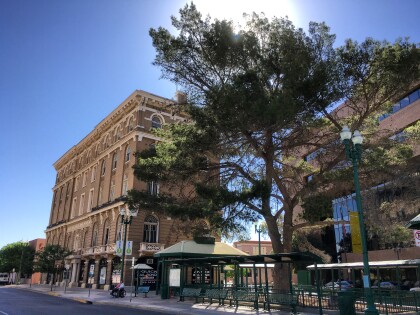

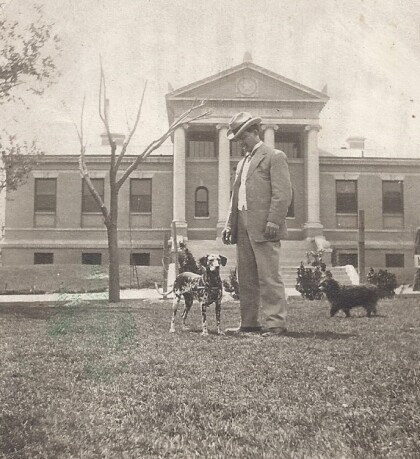
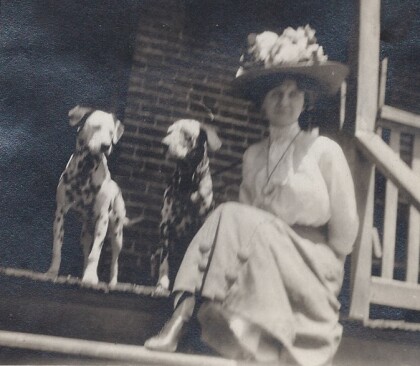
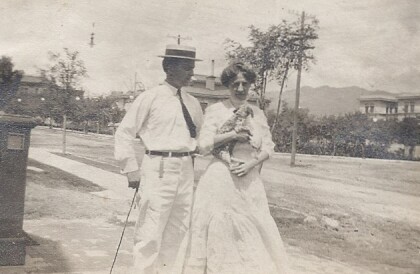
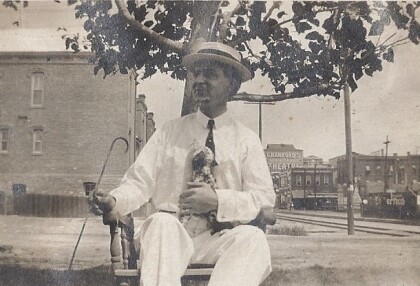
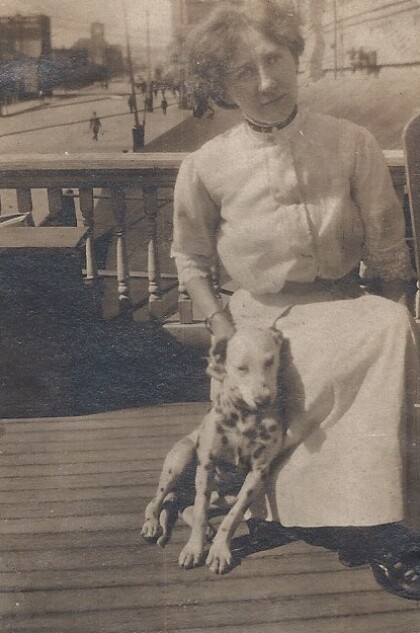
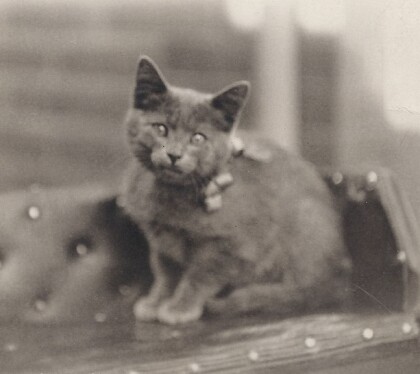
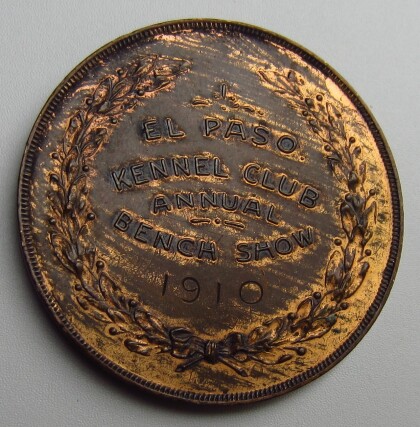
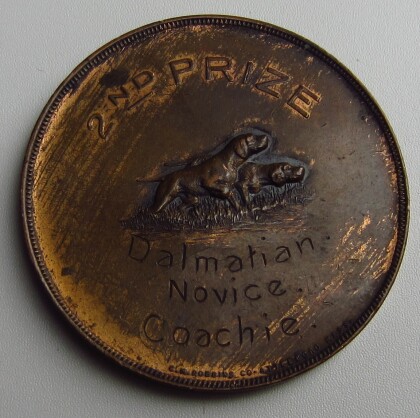
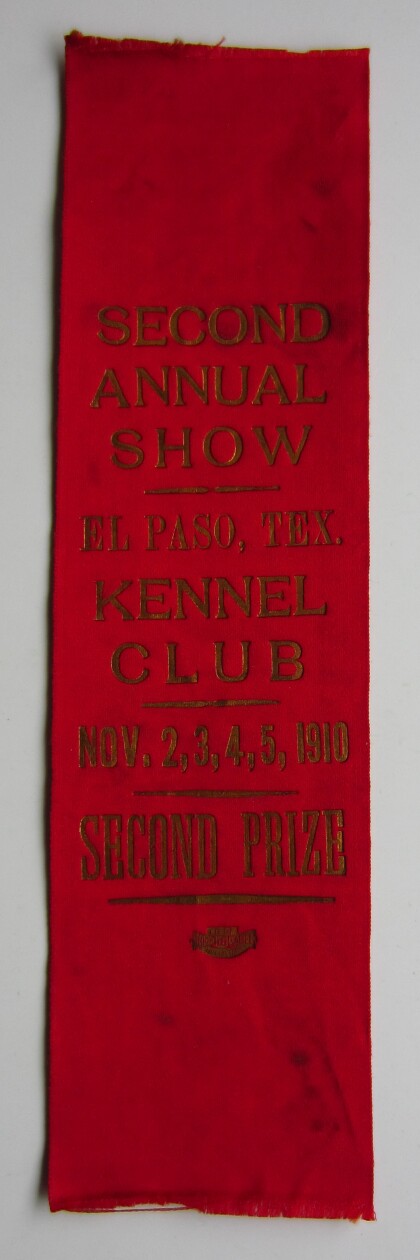
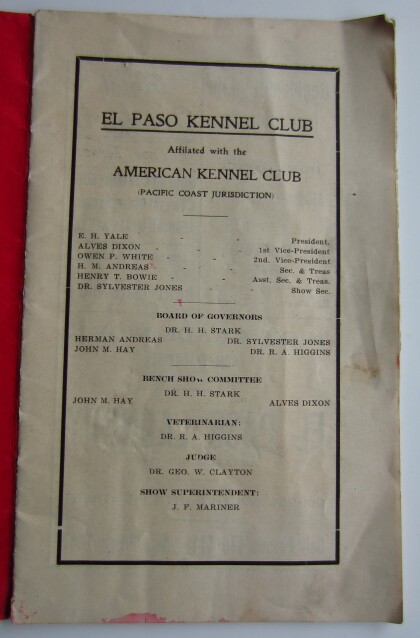
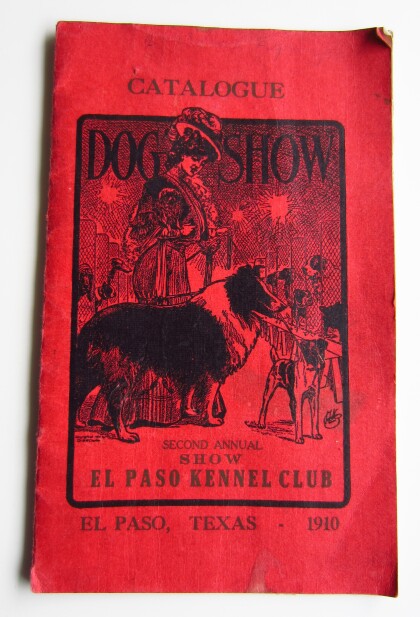
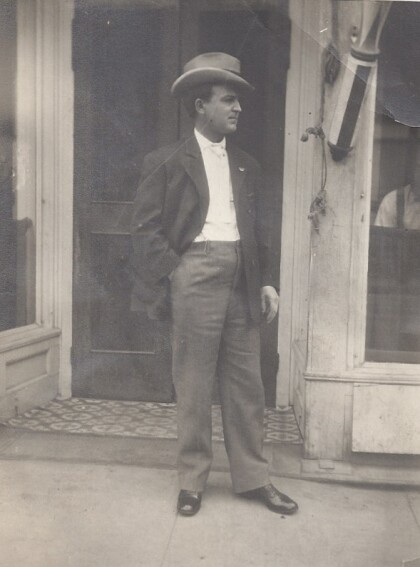
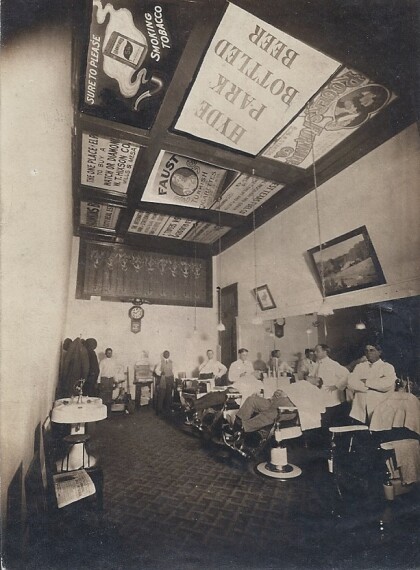
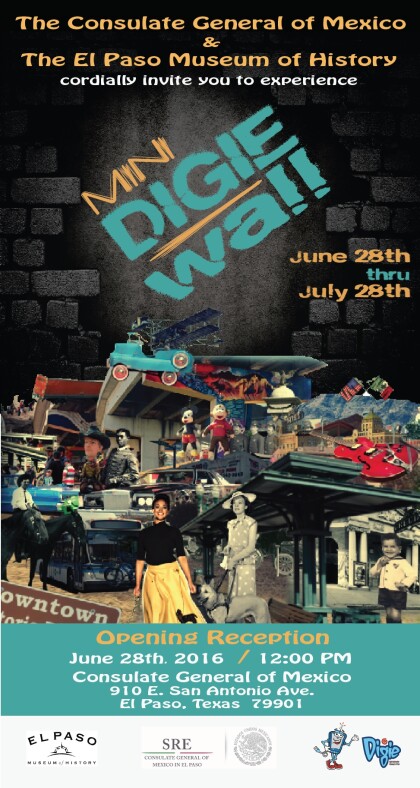

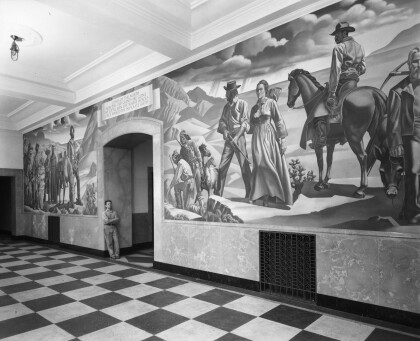
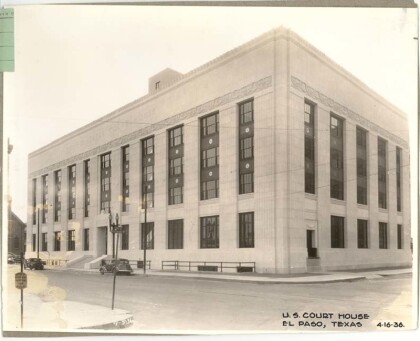
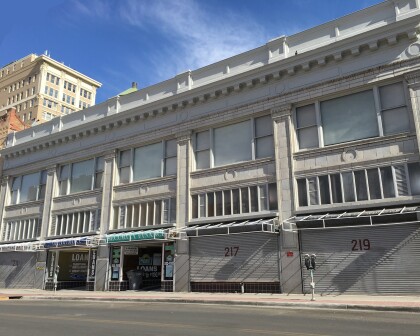
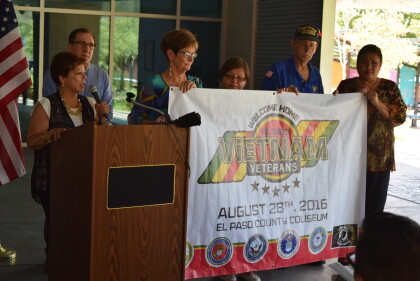
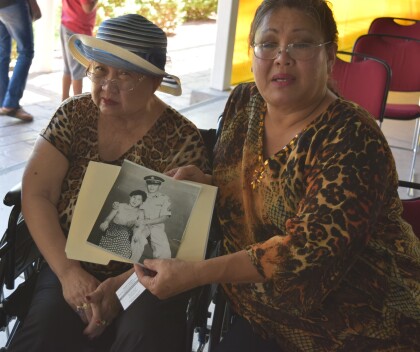
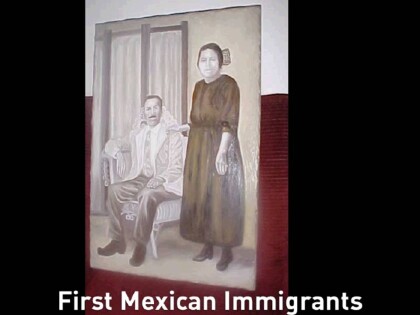
Comments
Add a comment